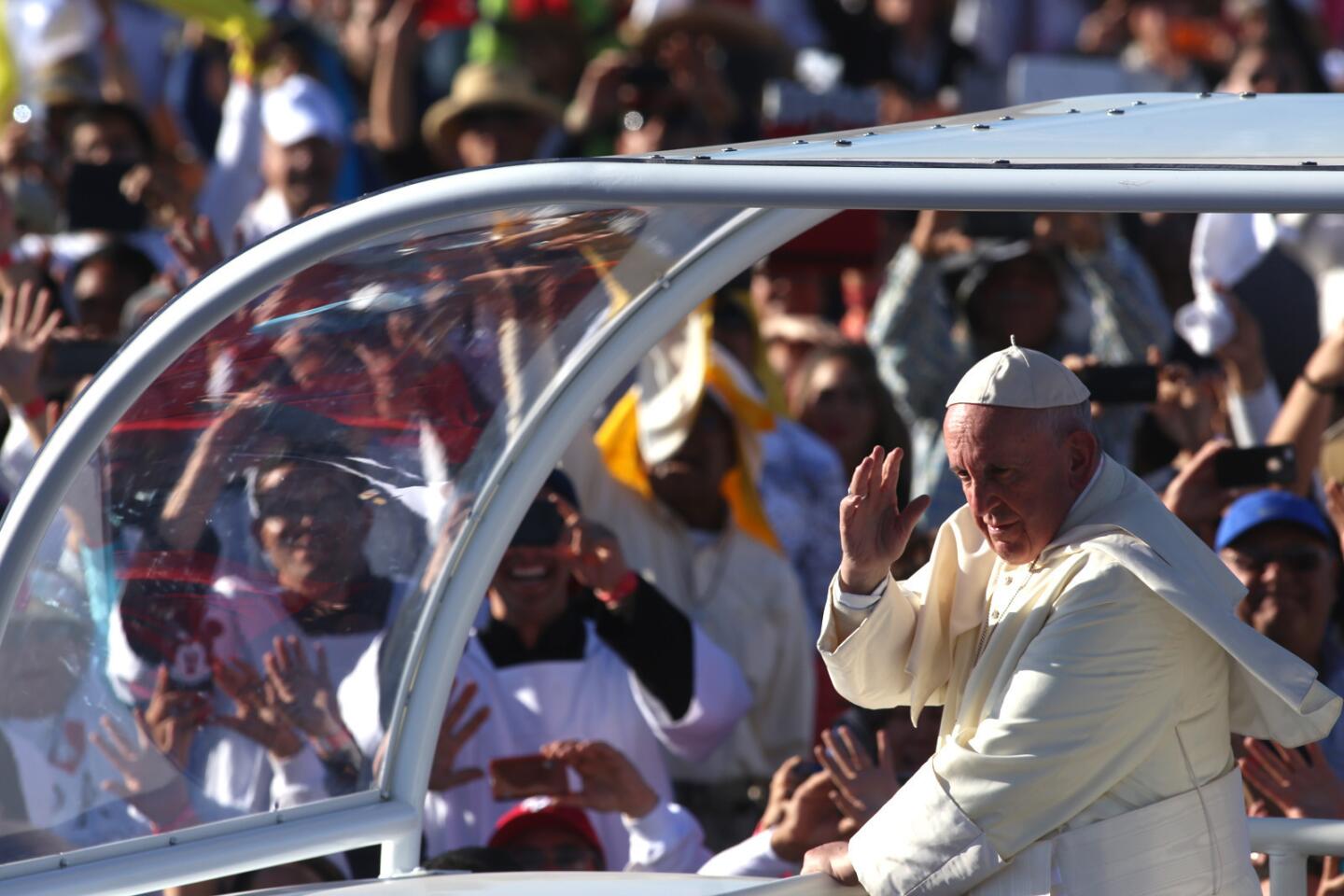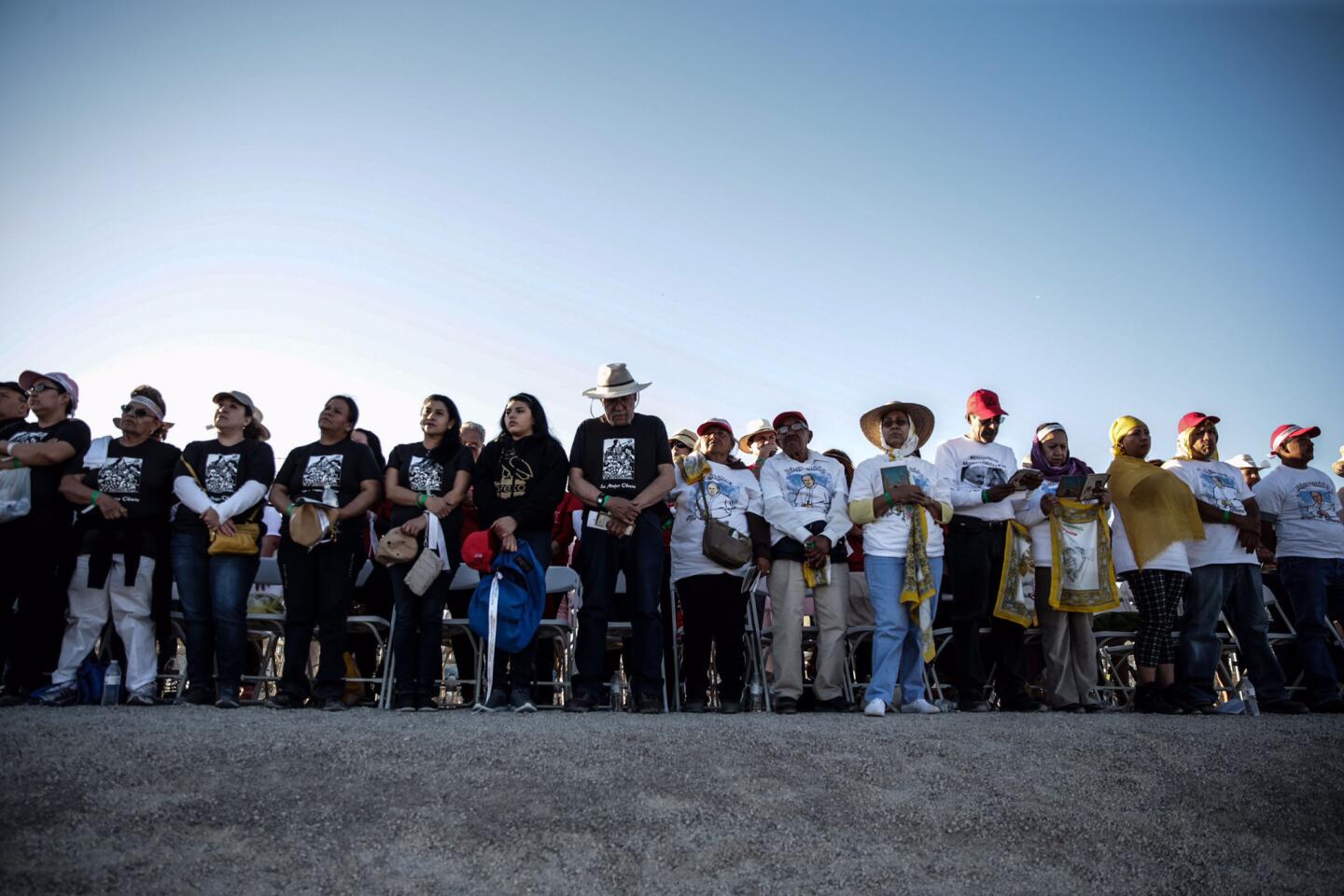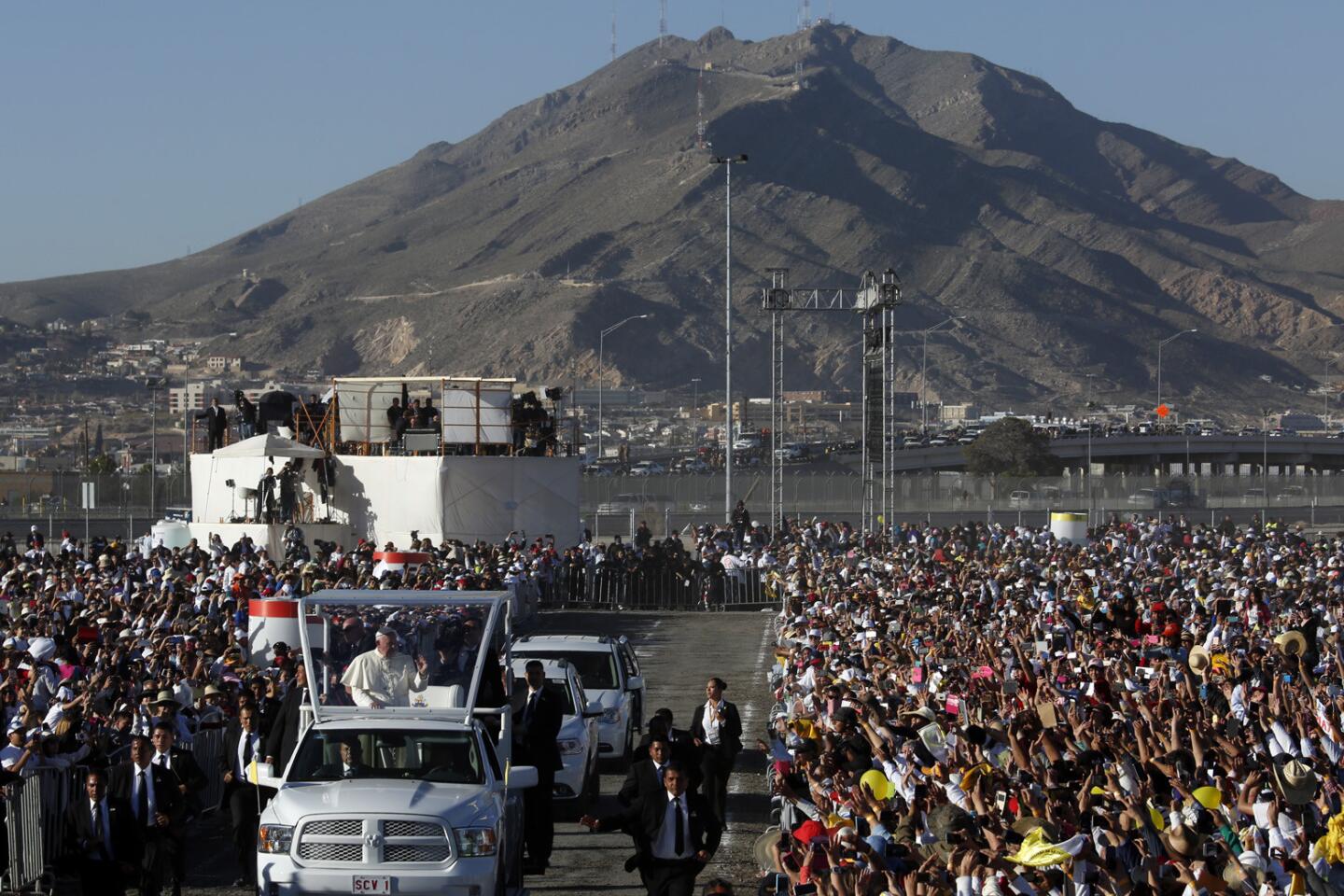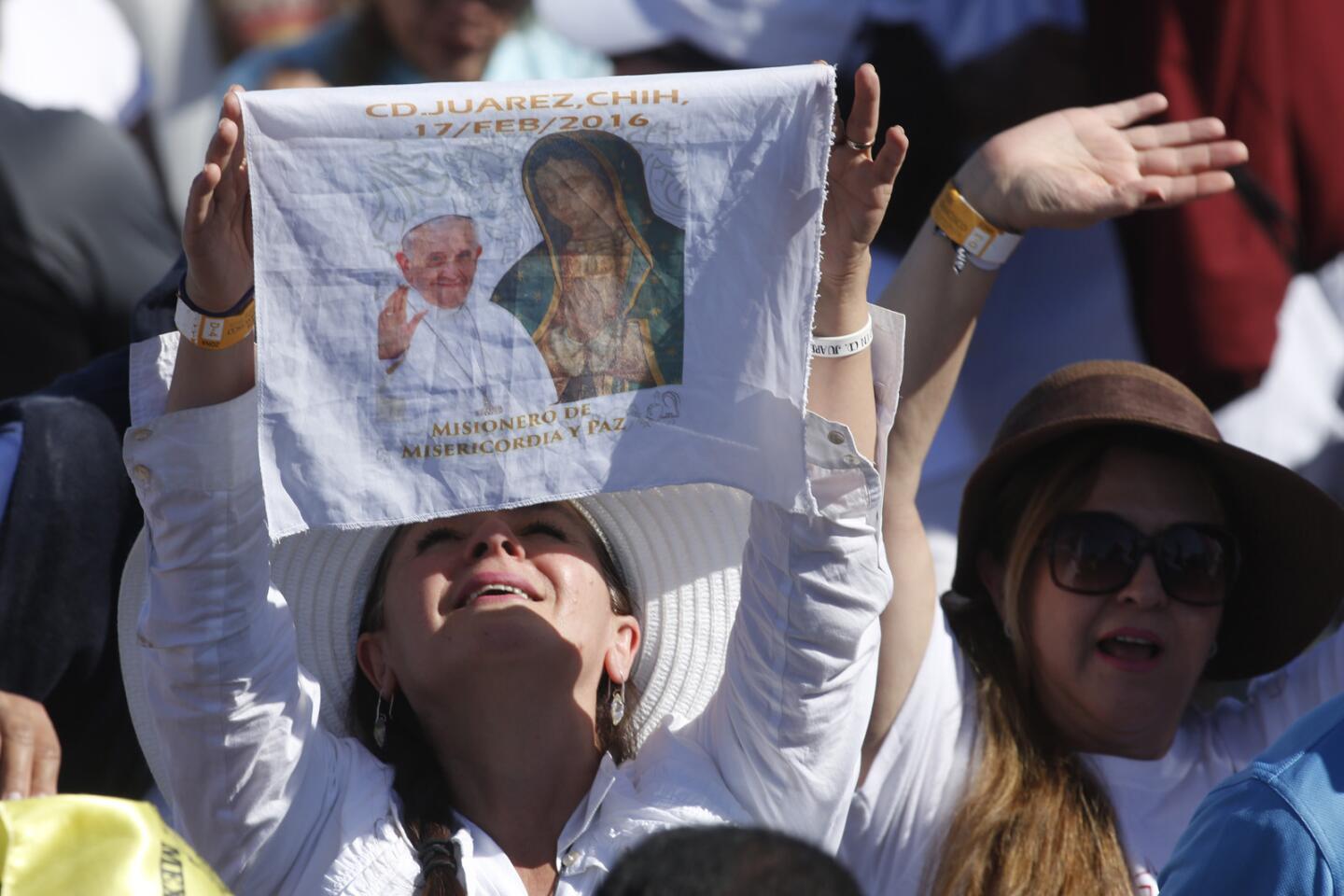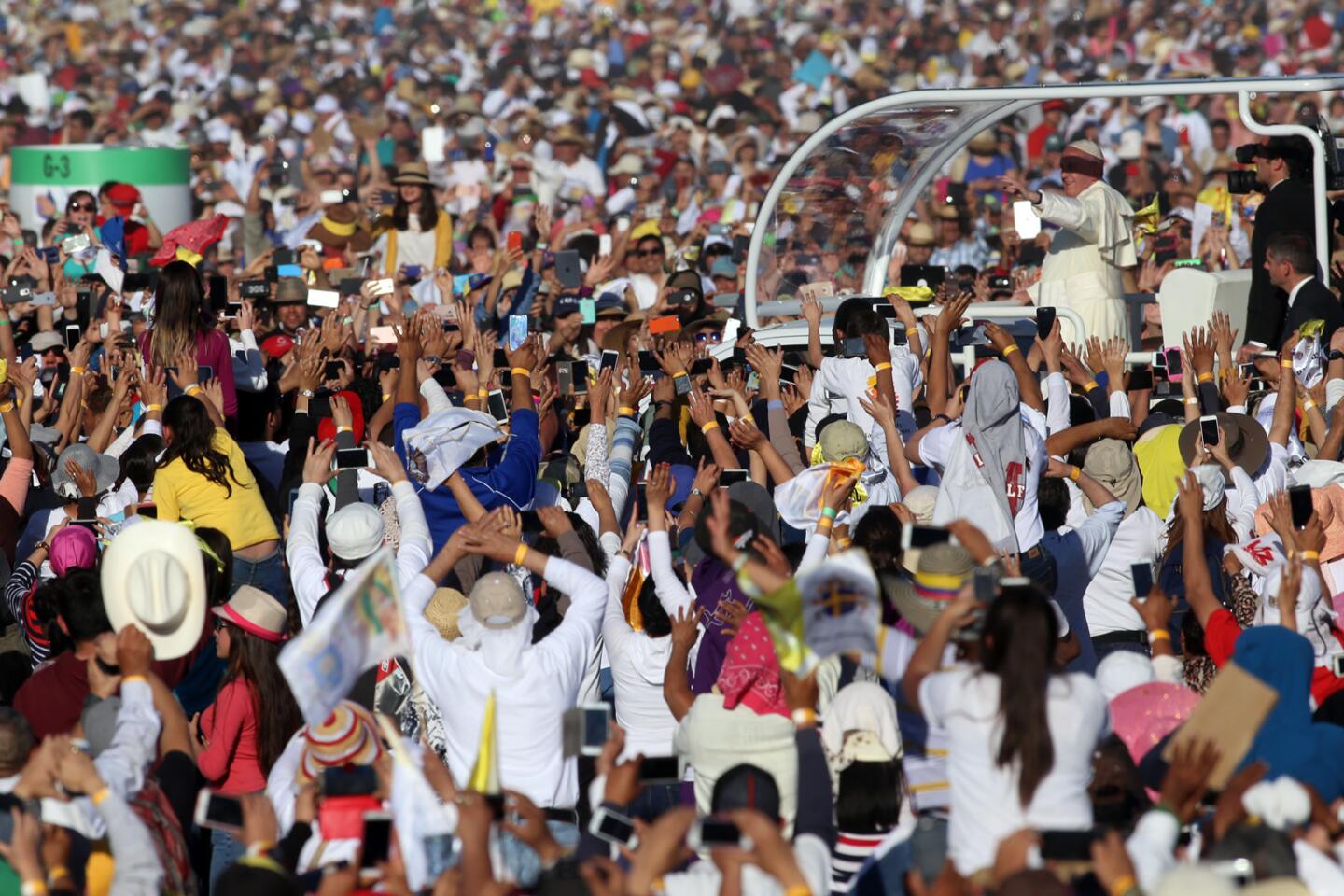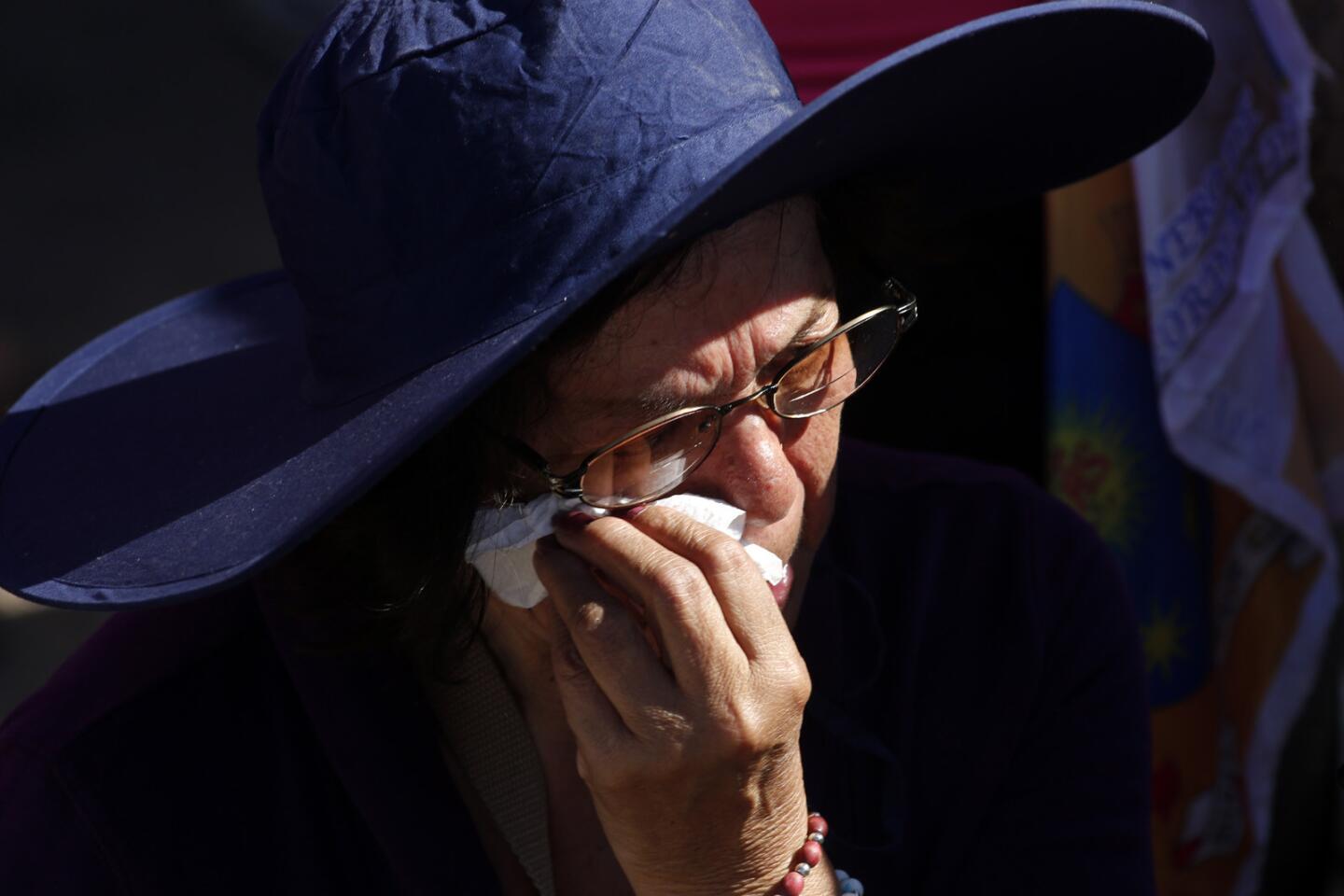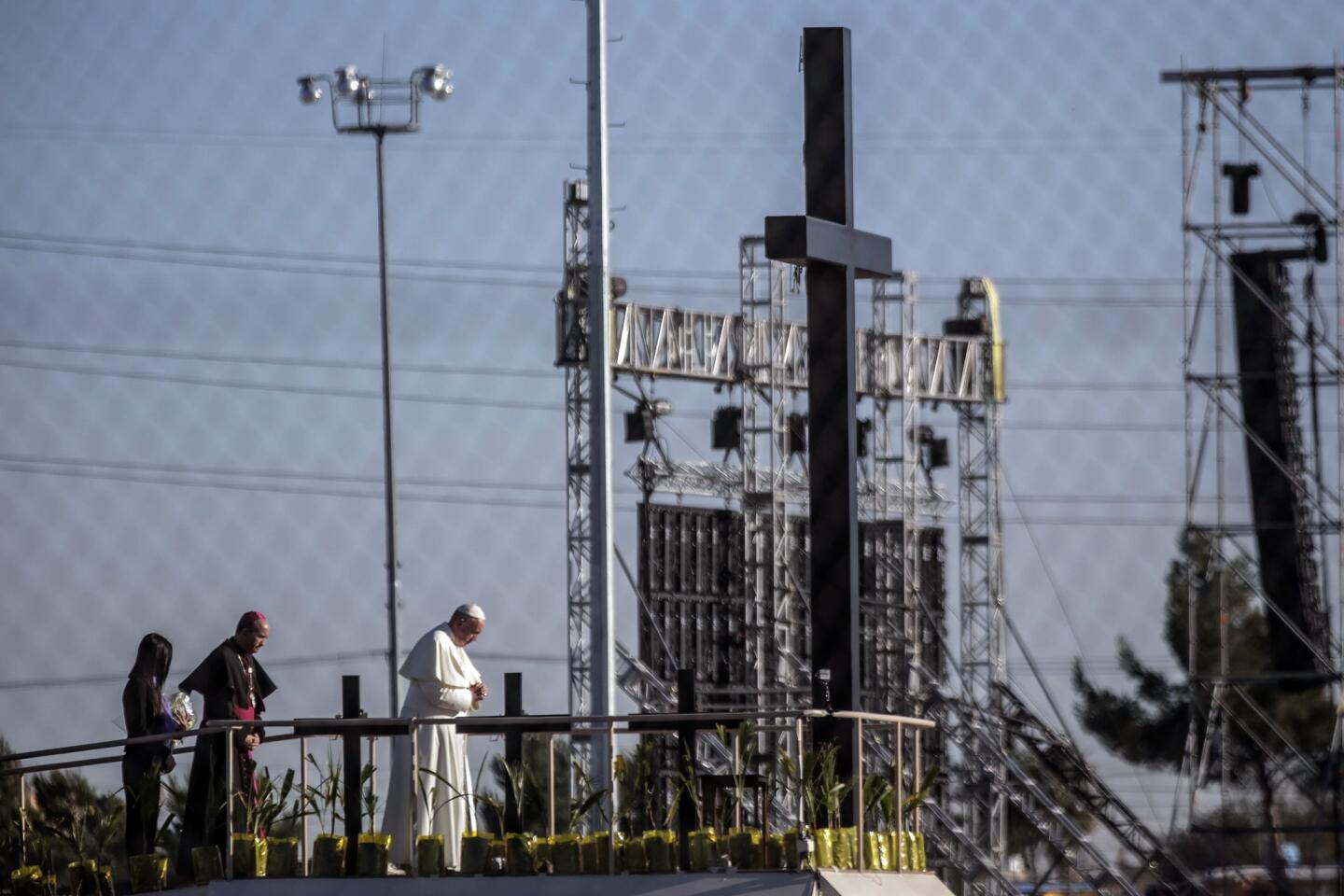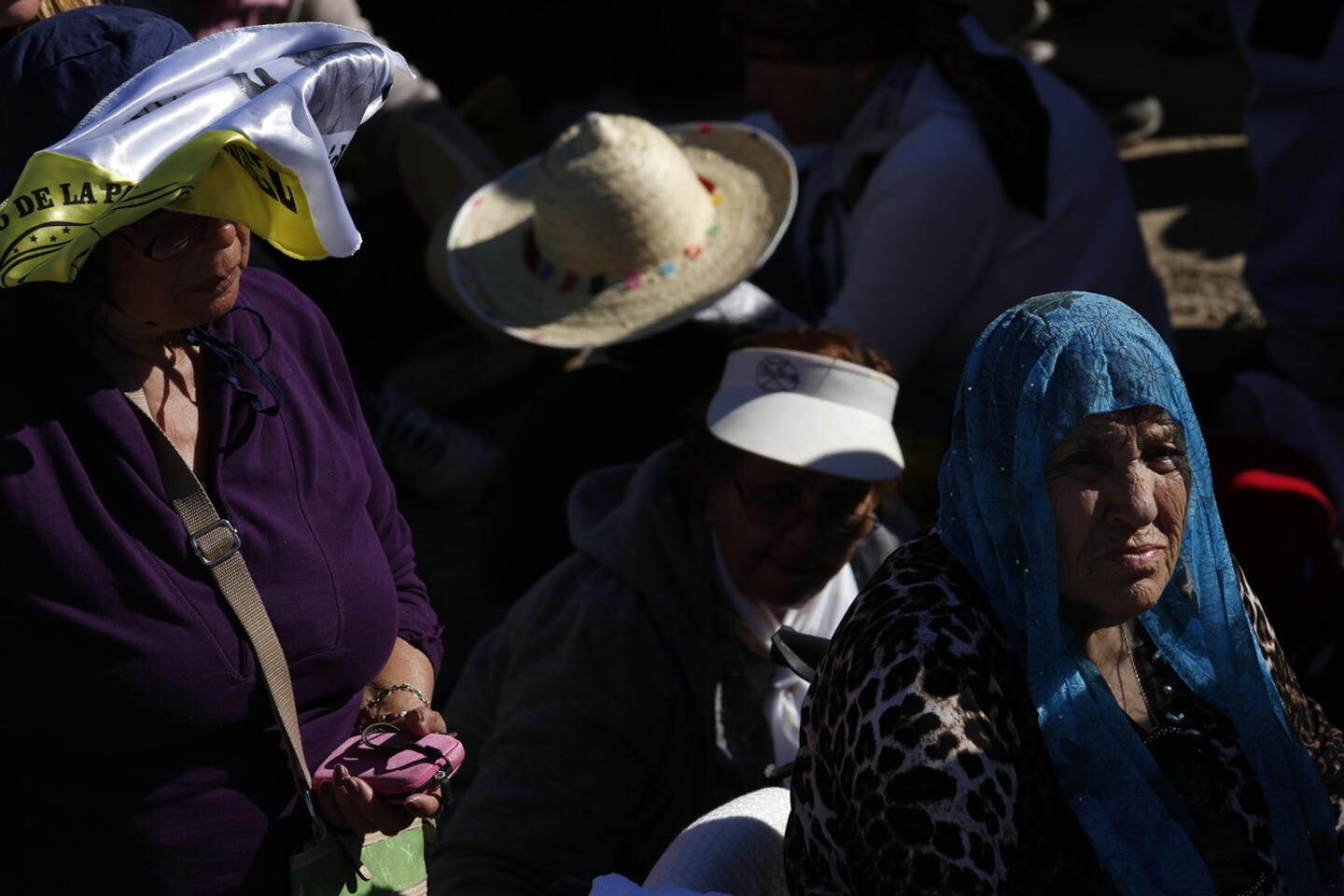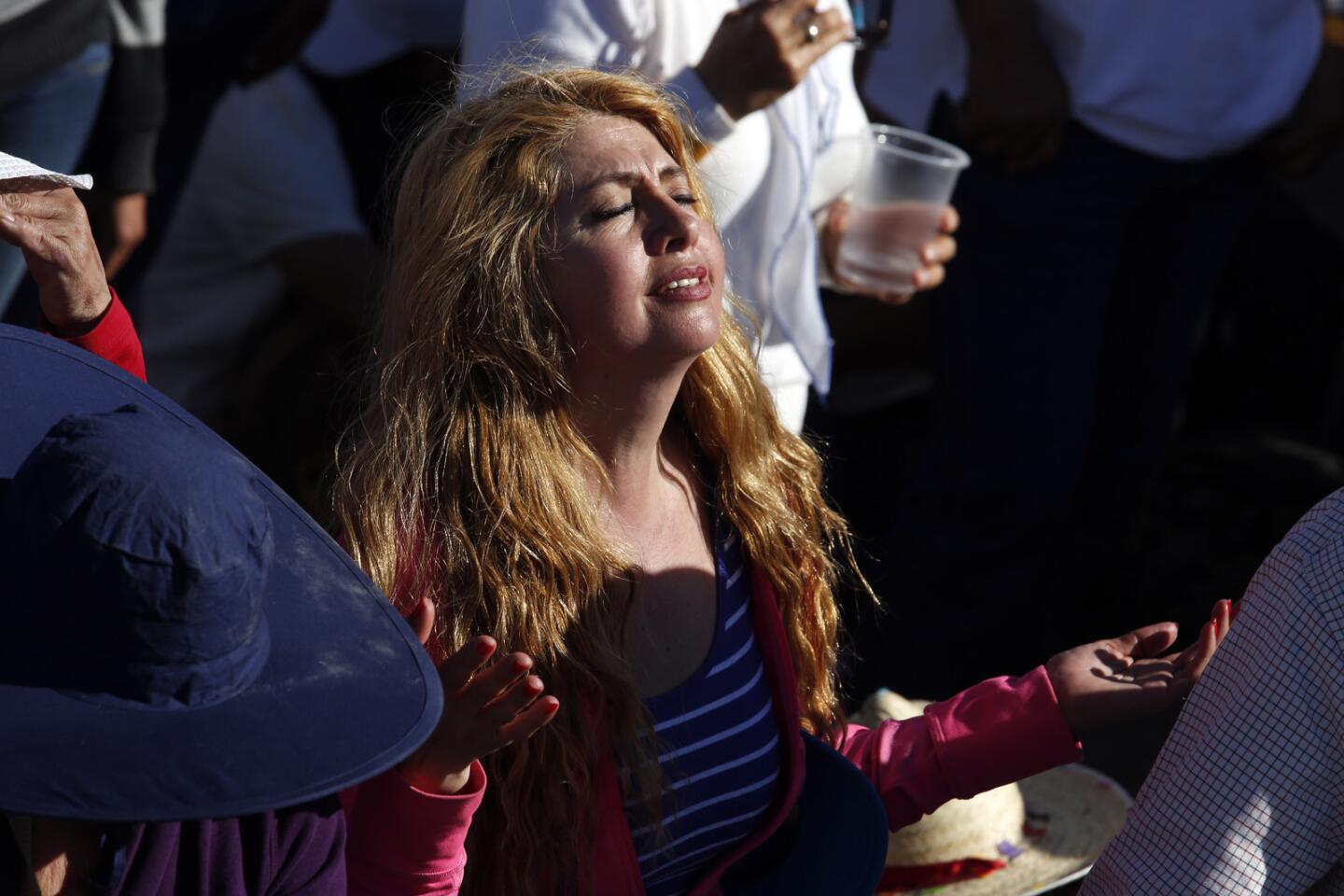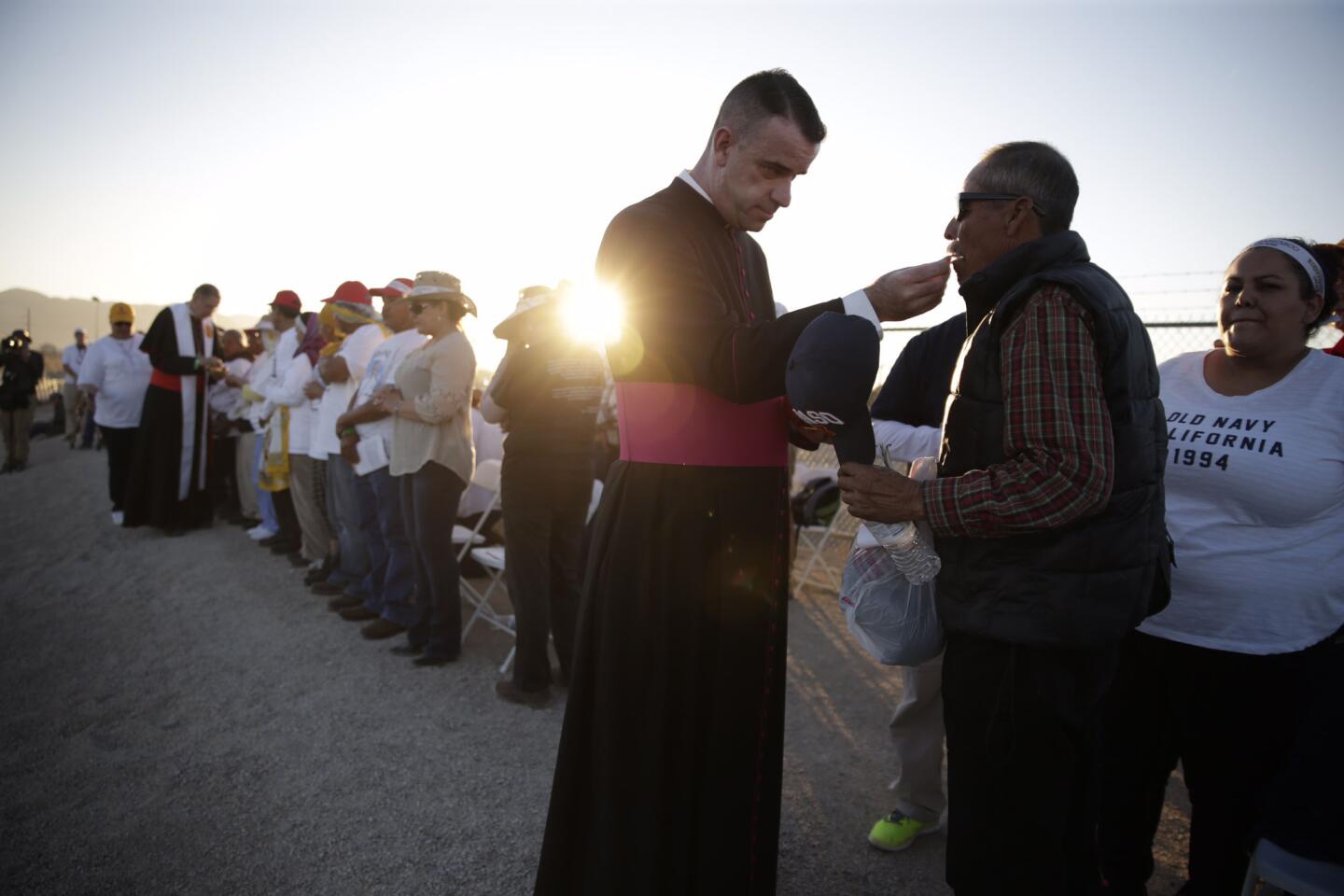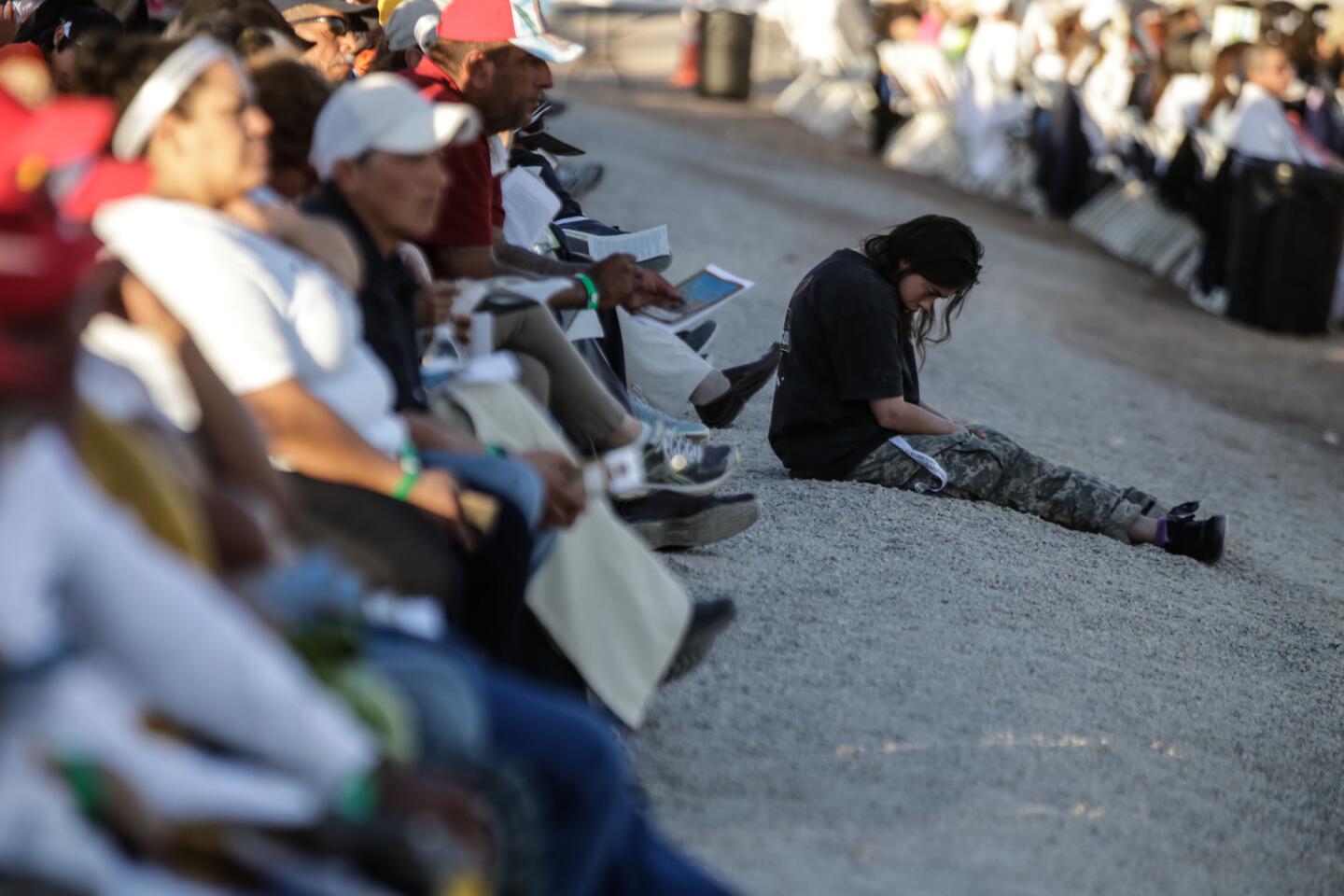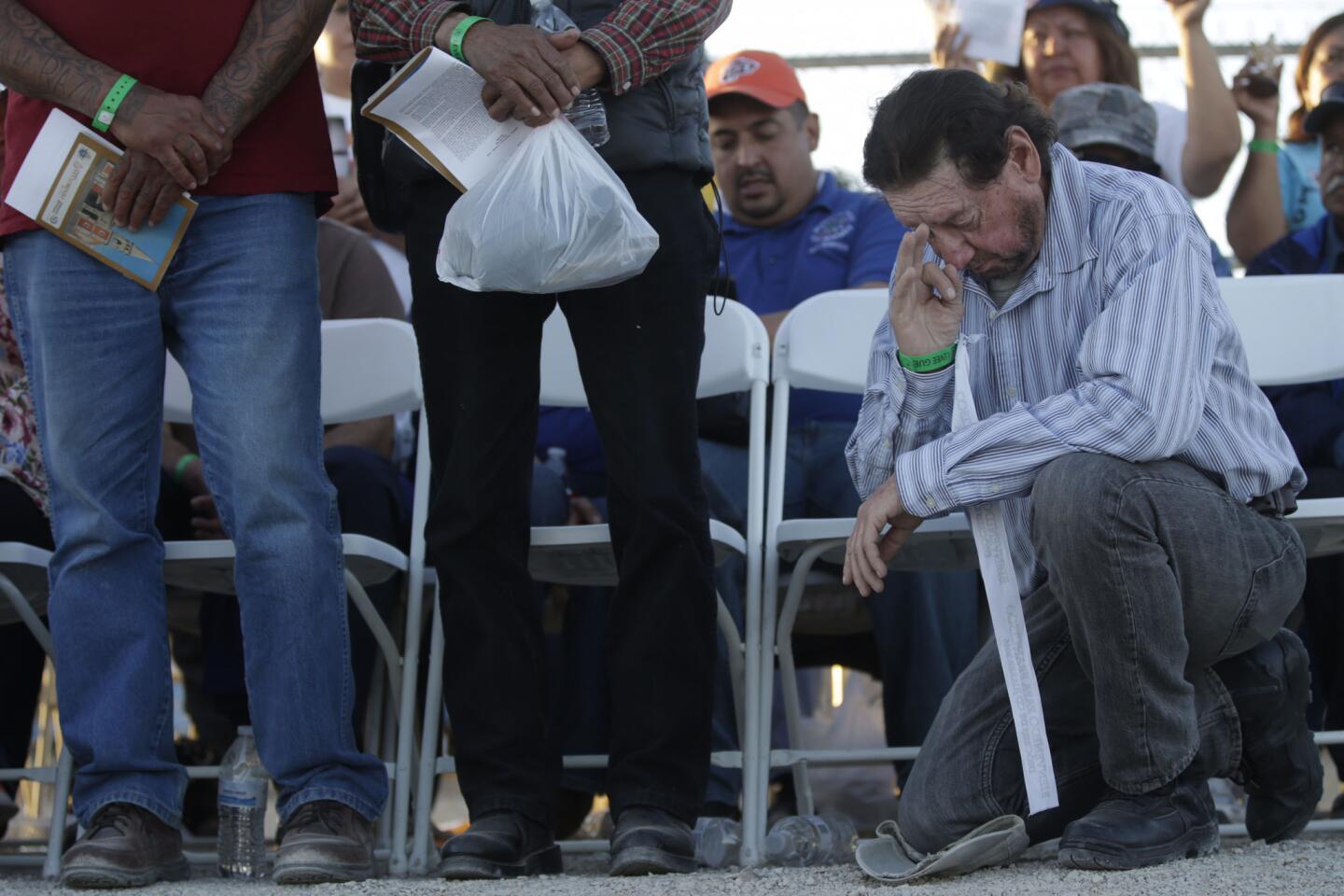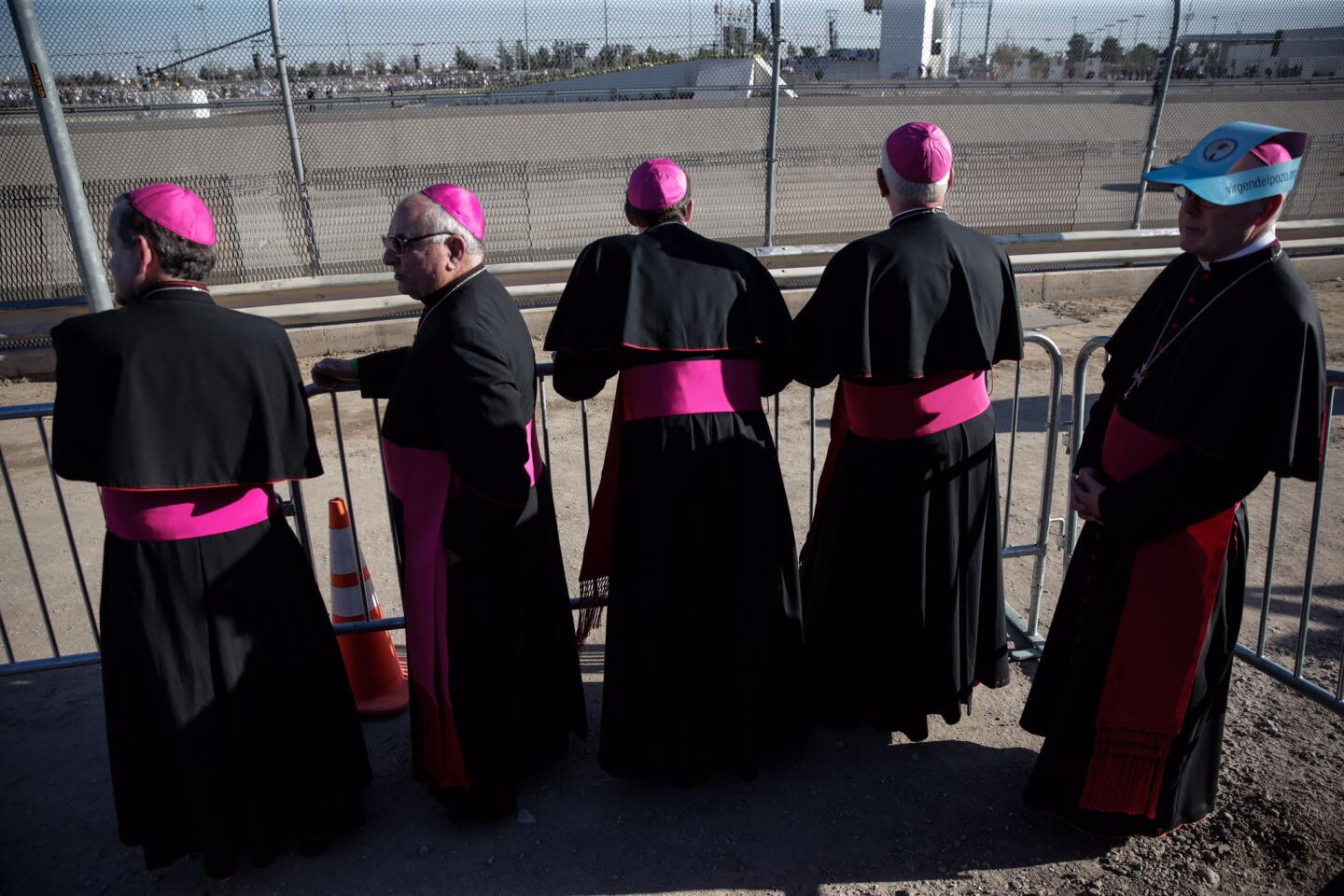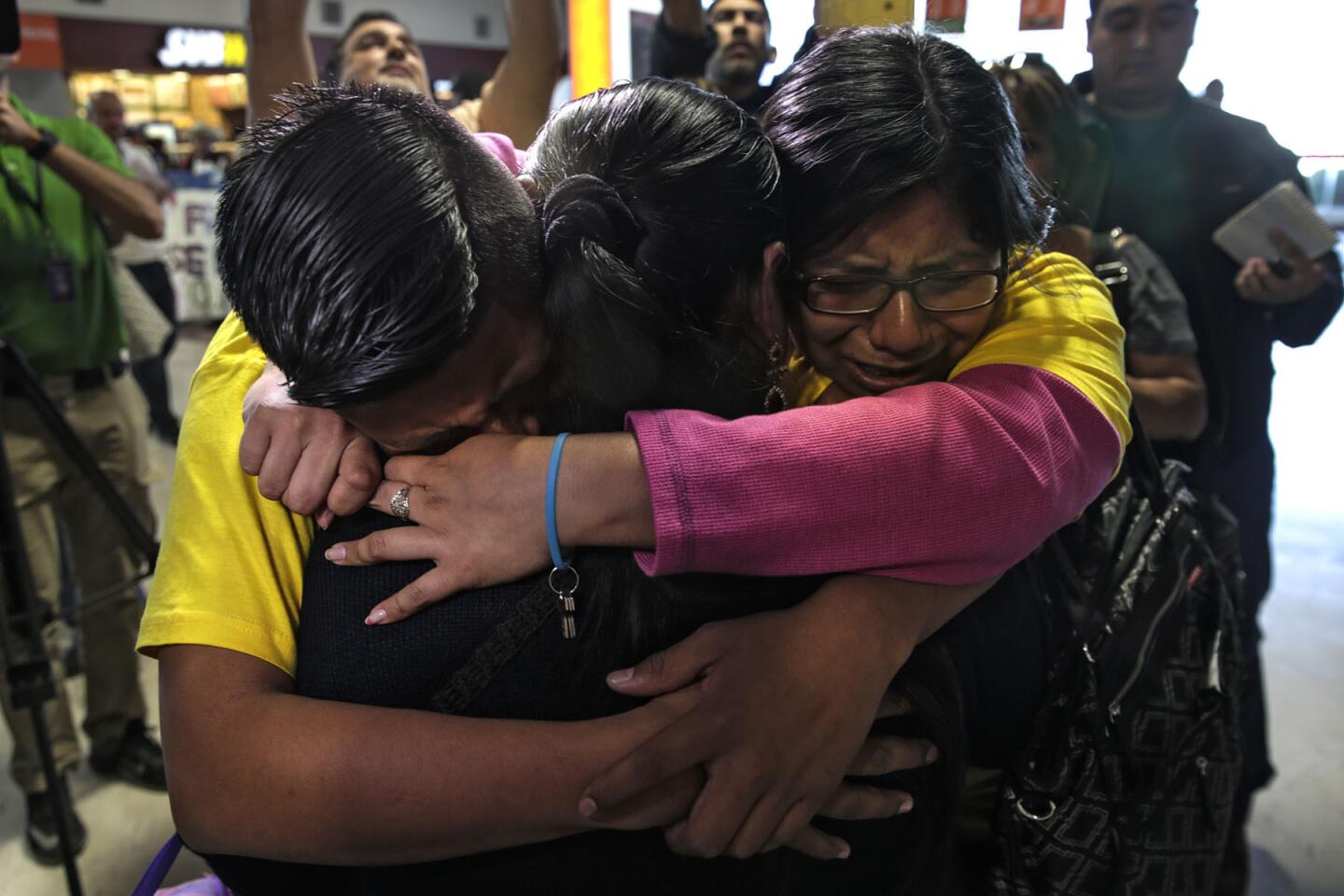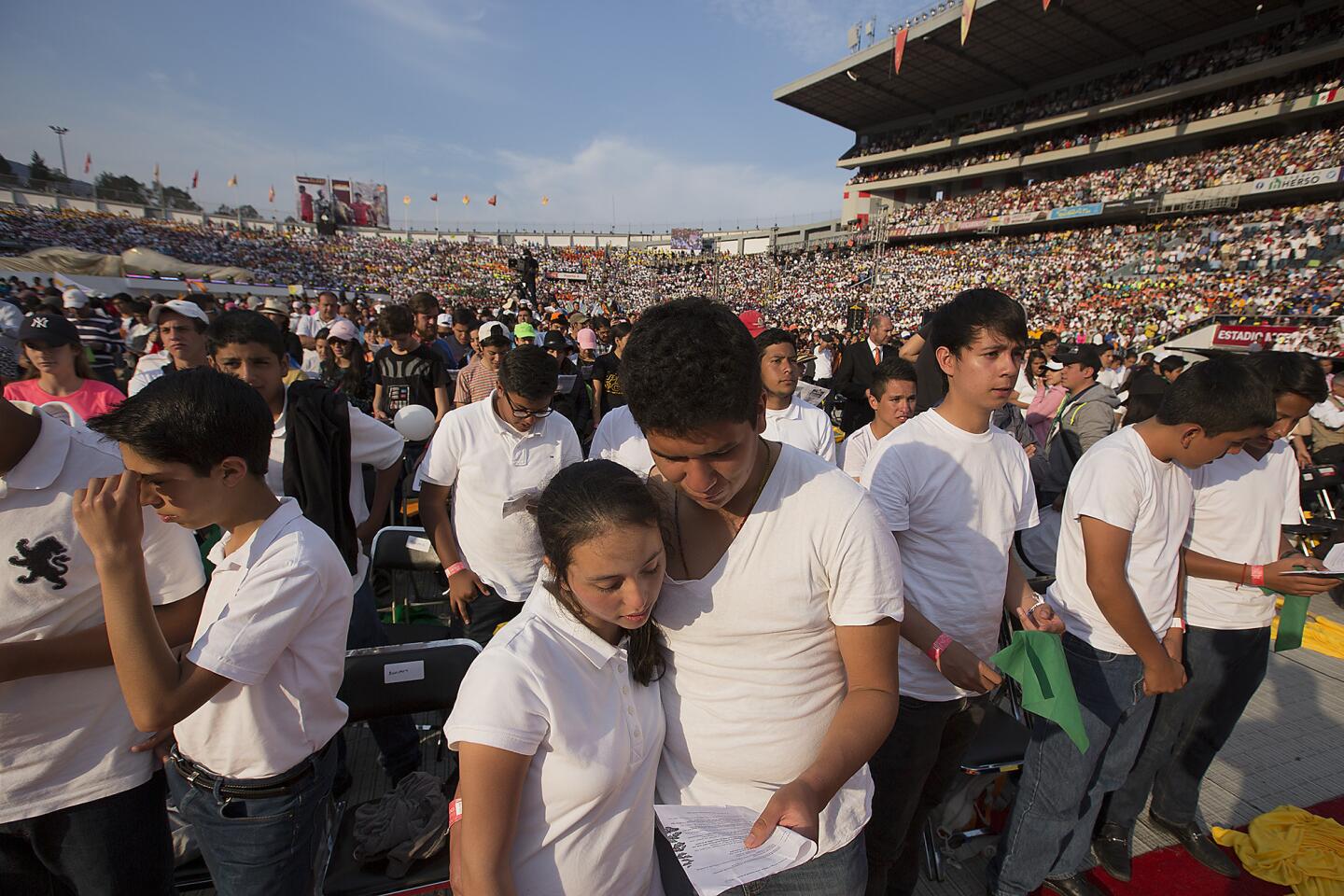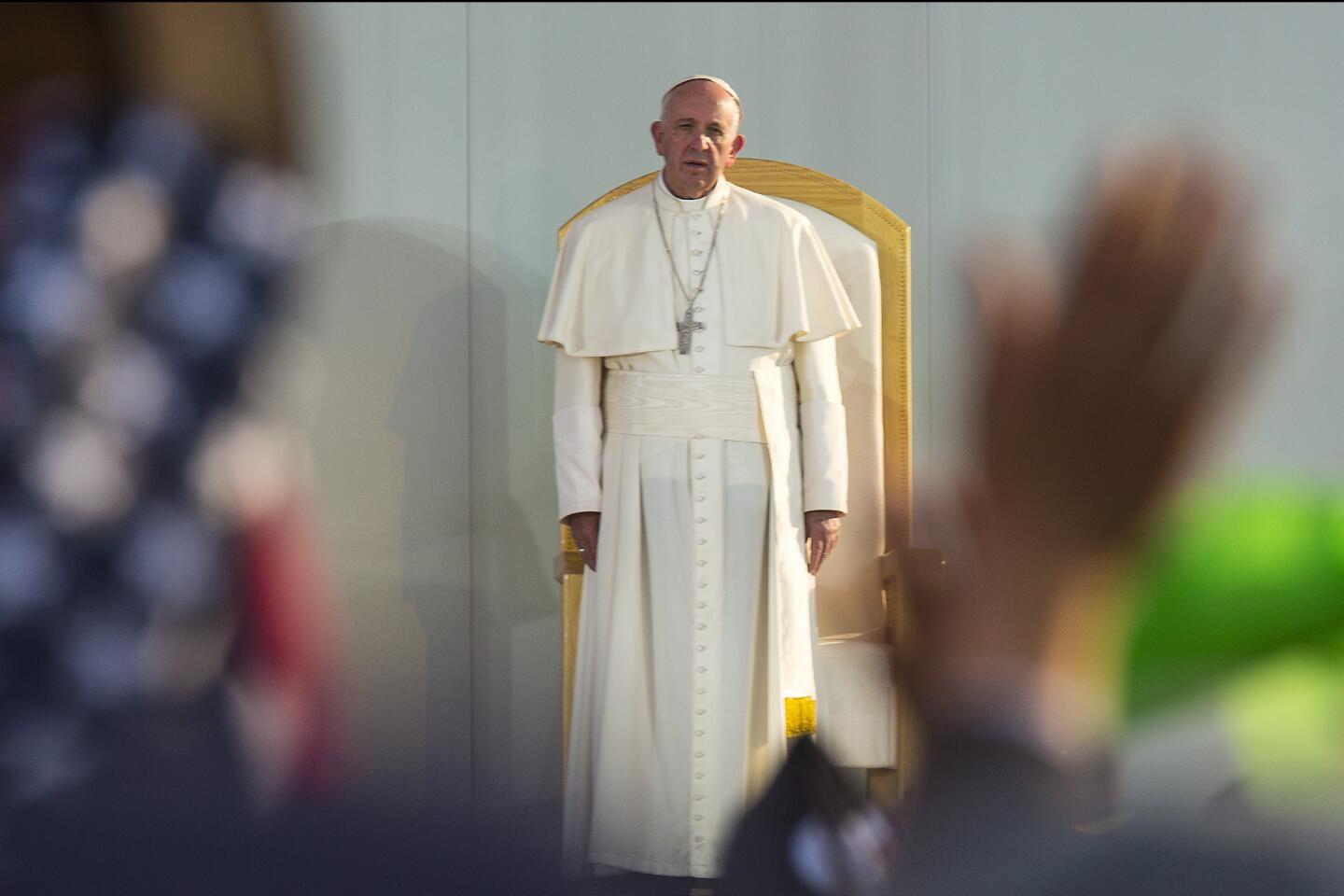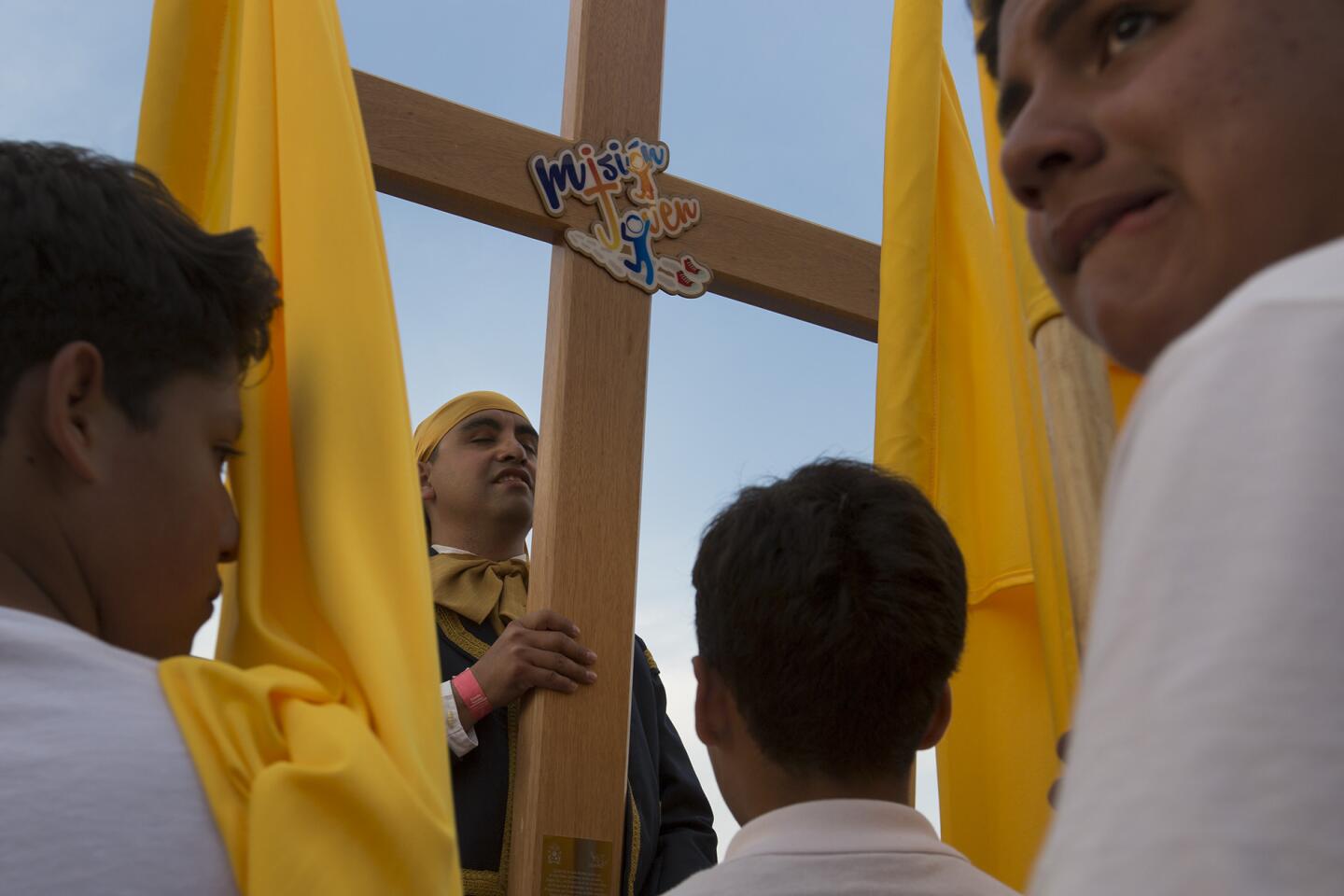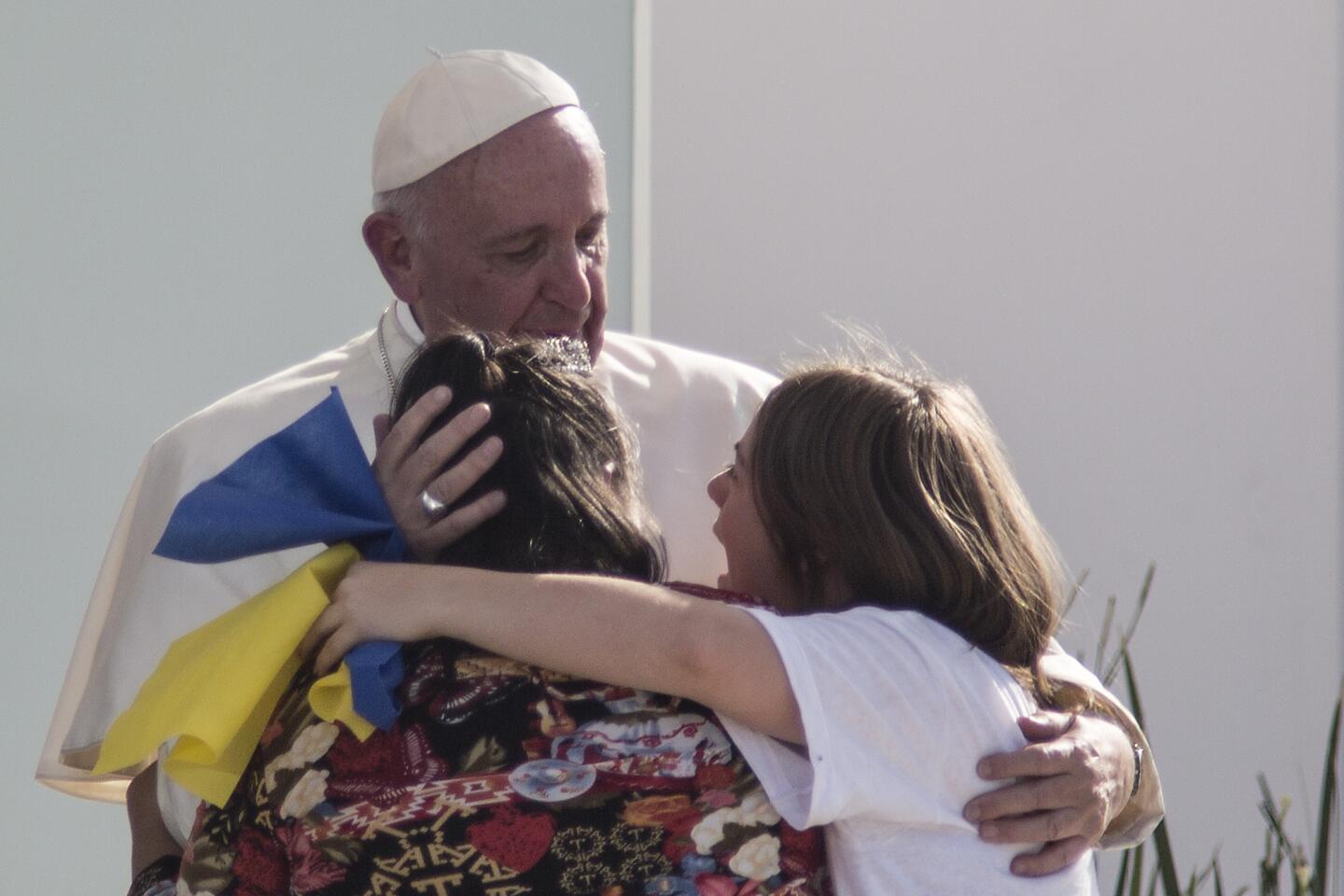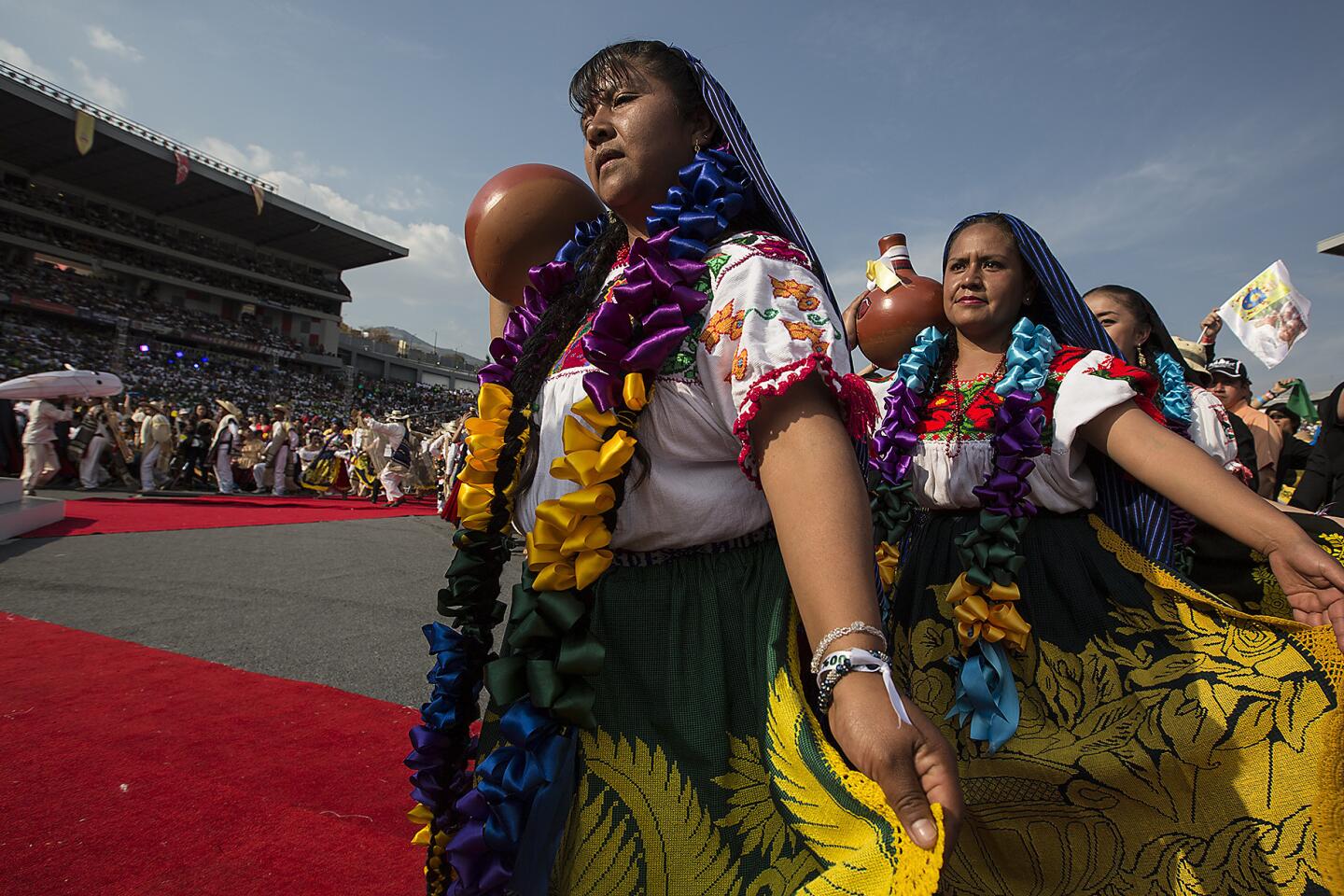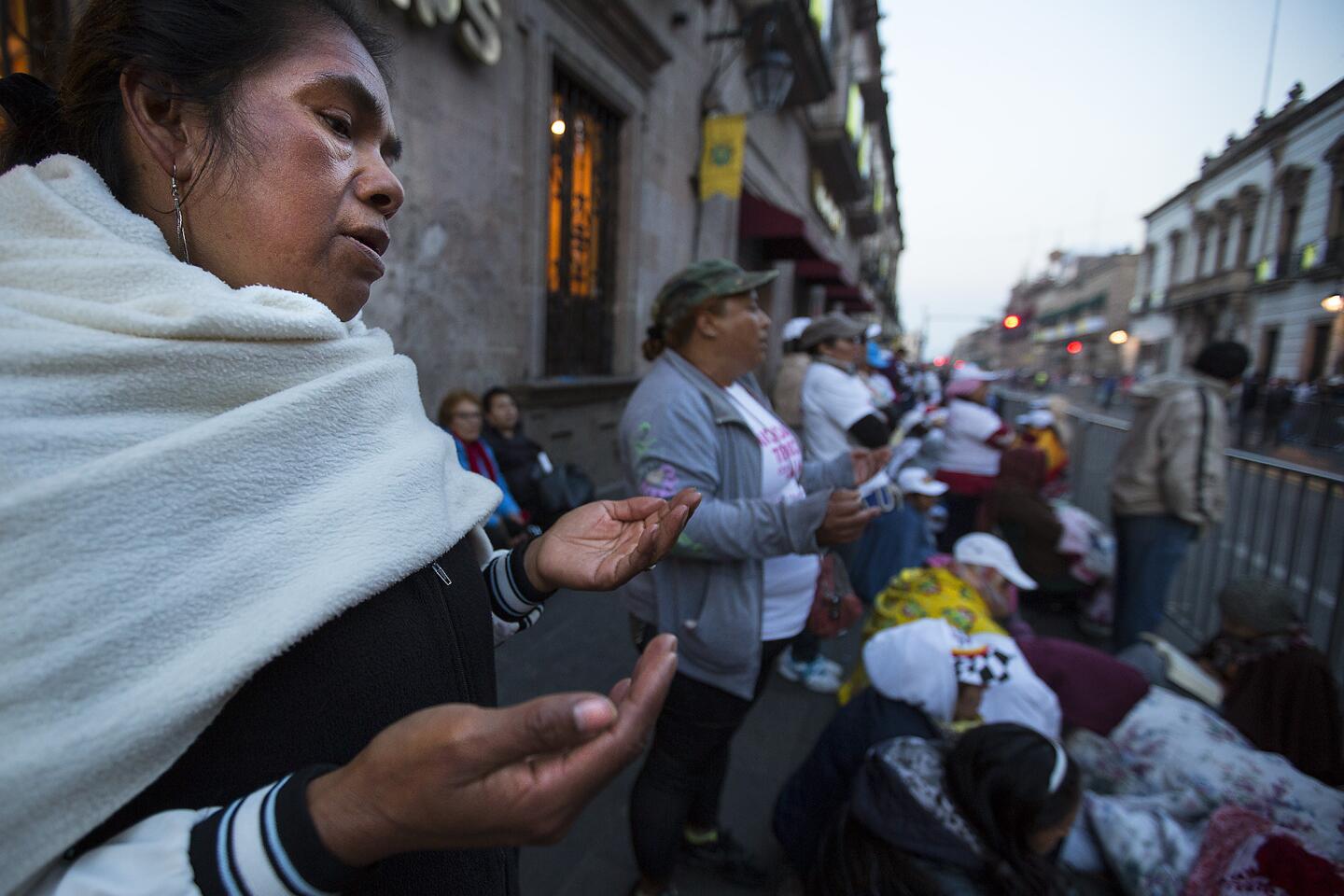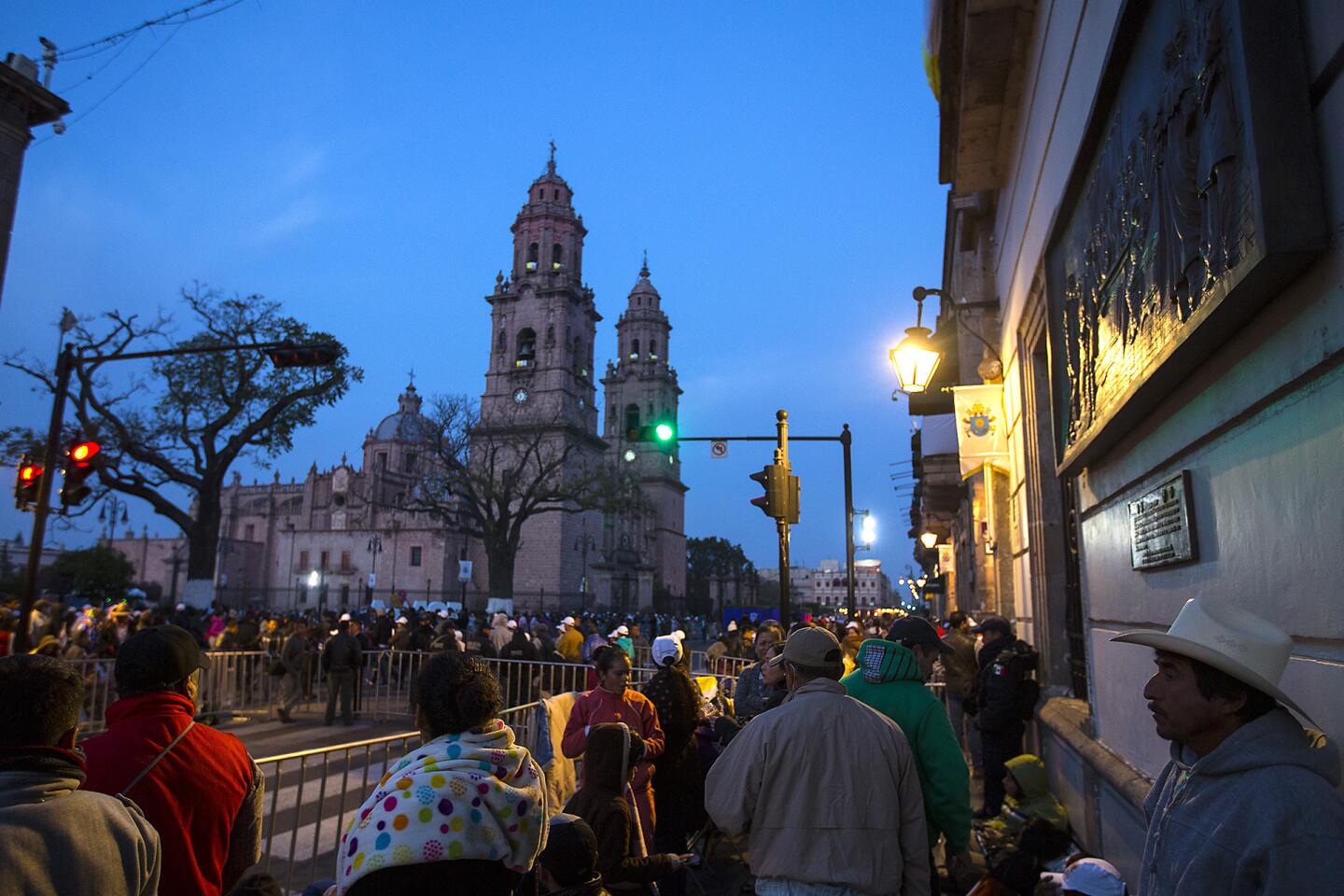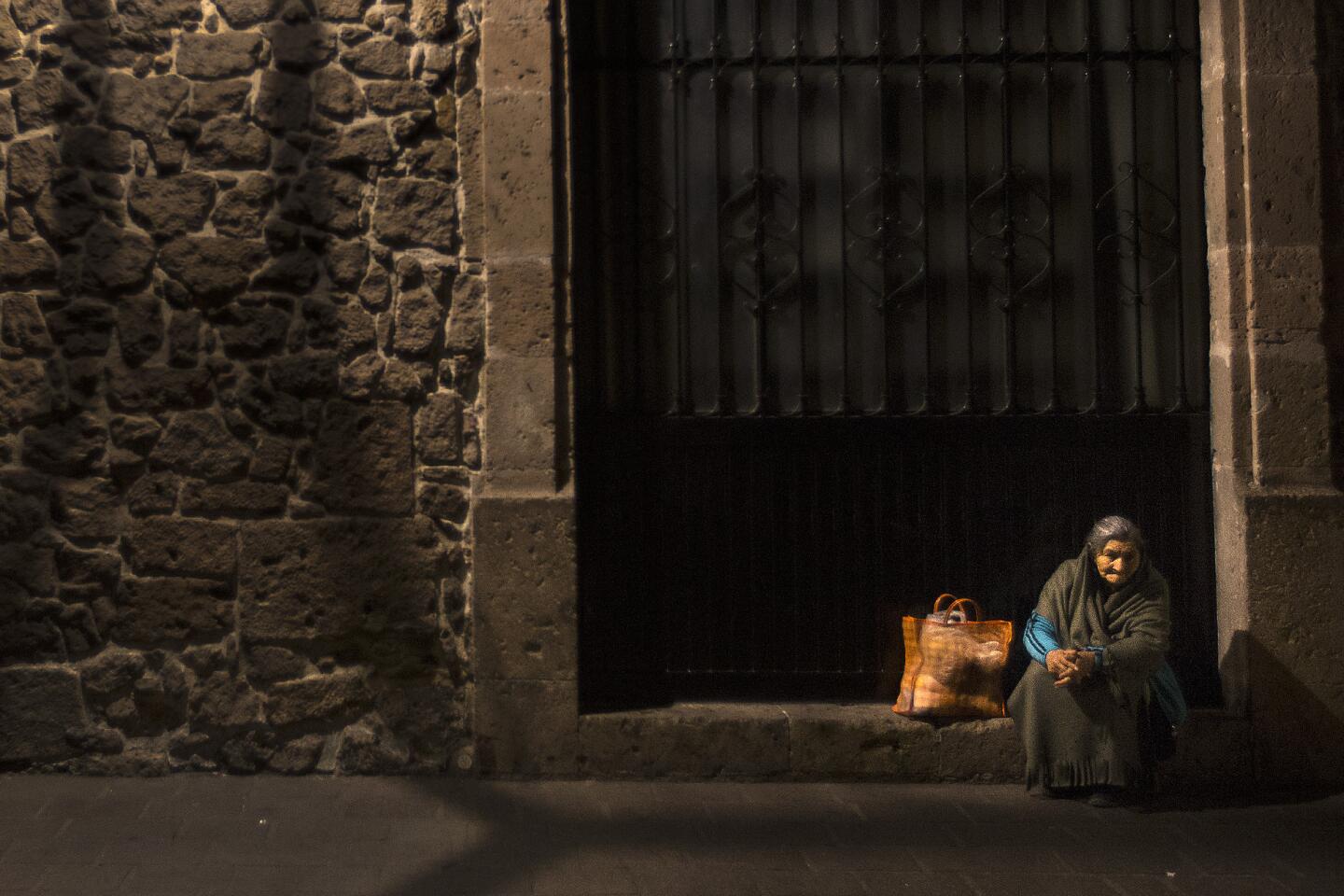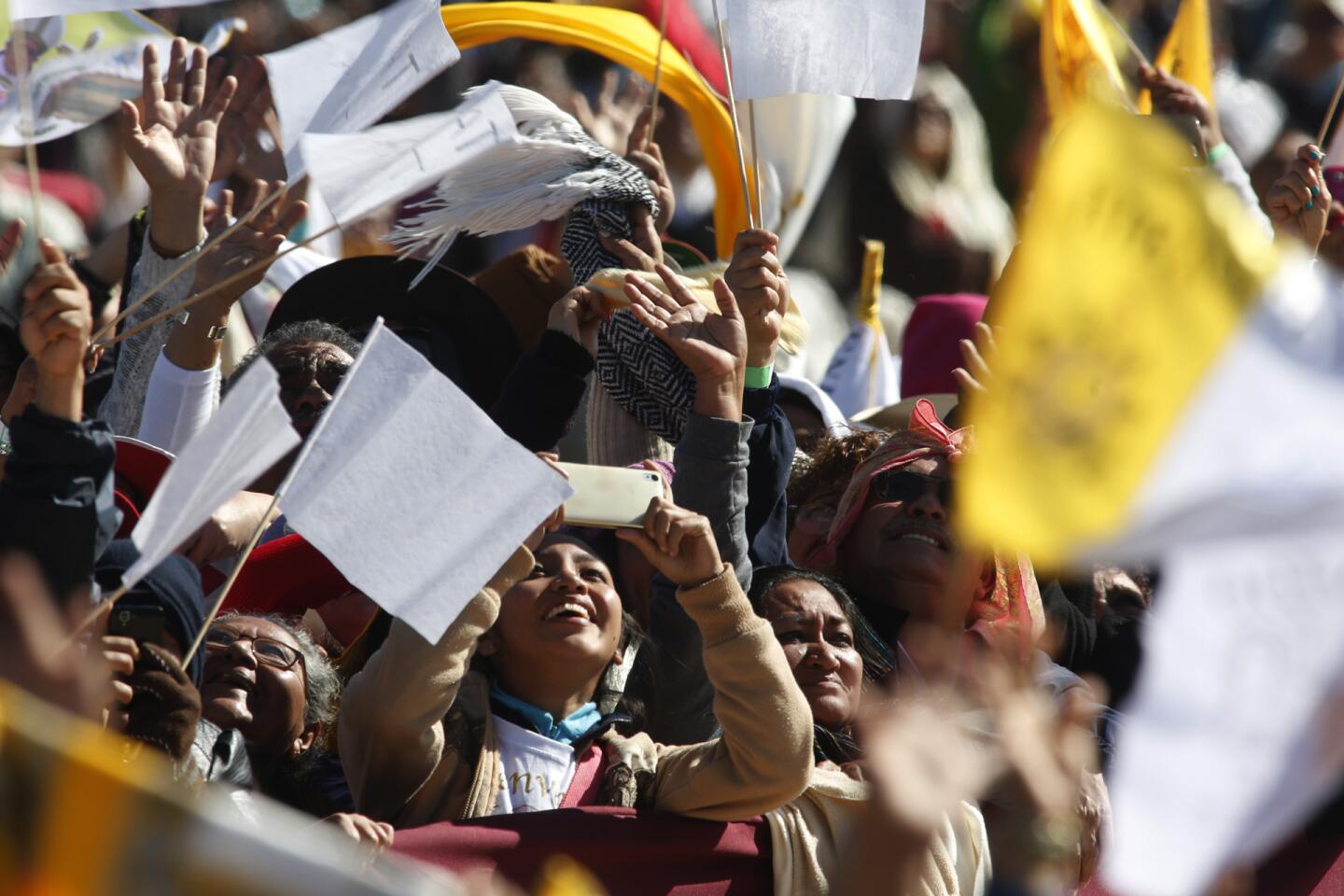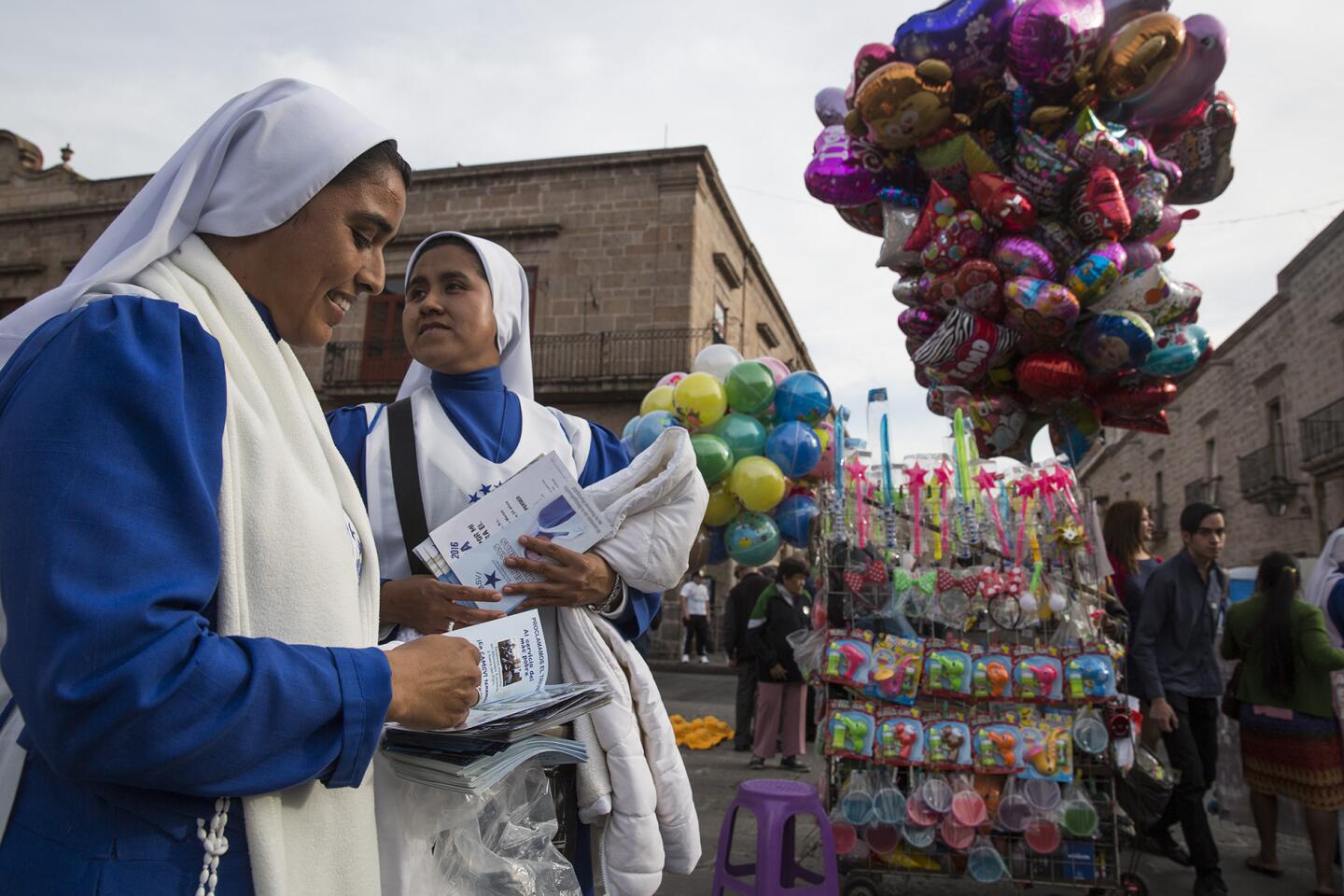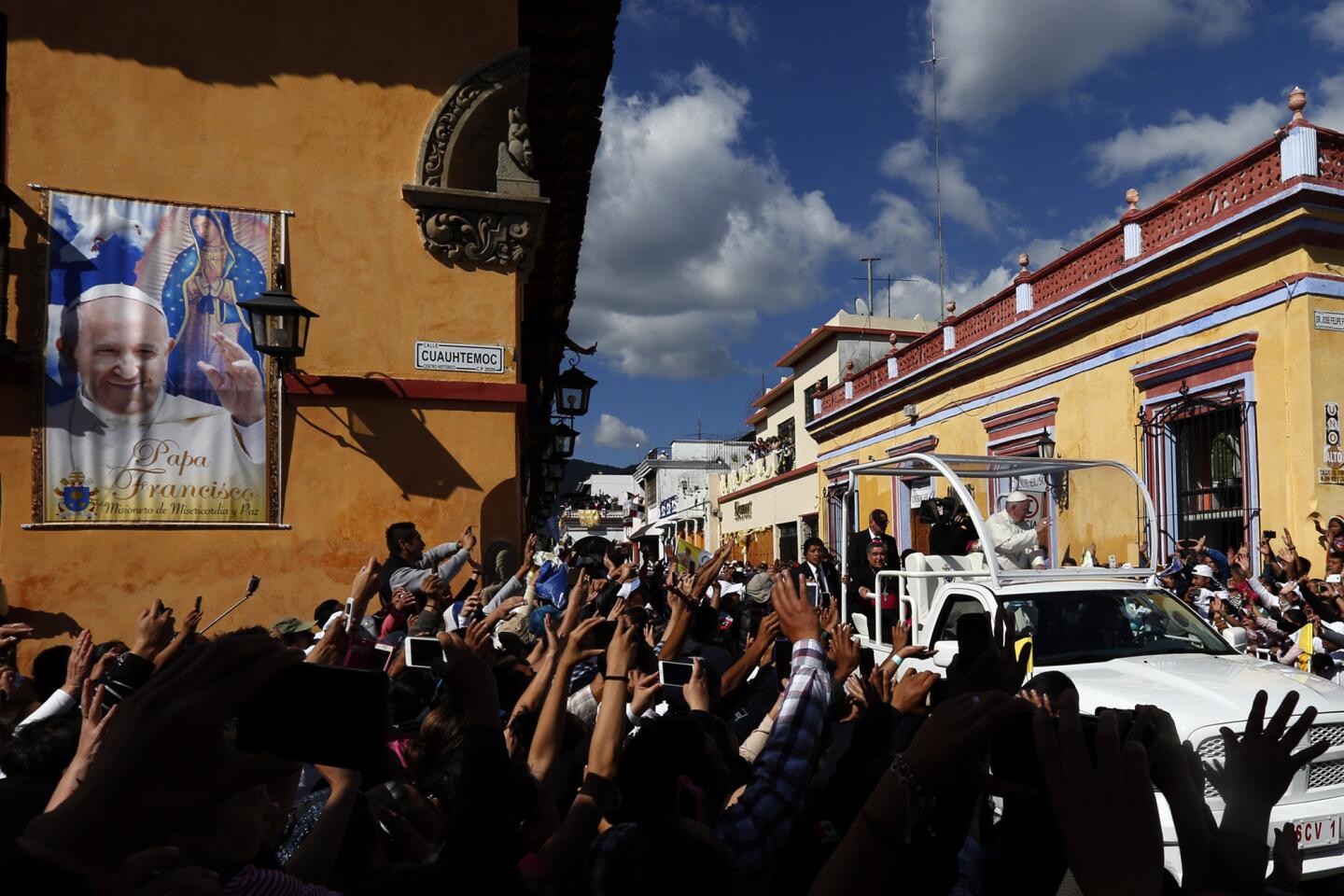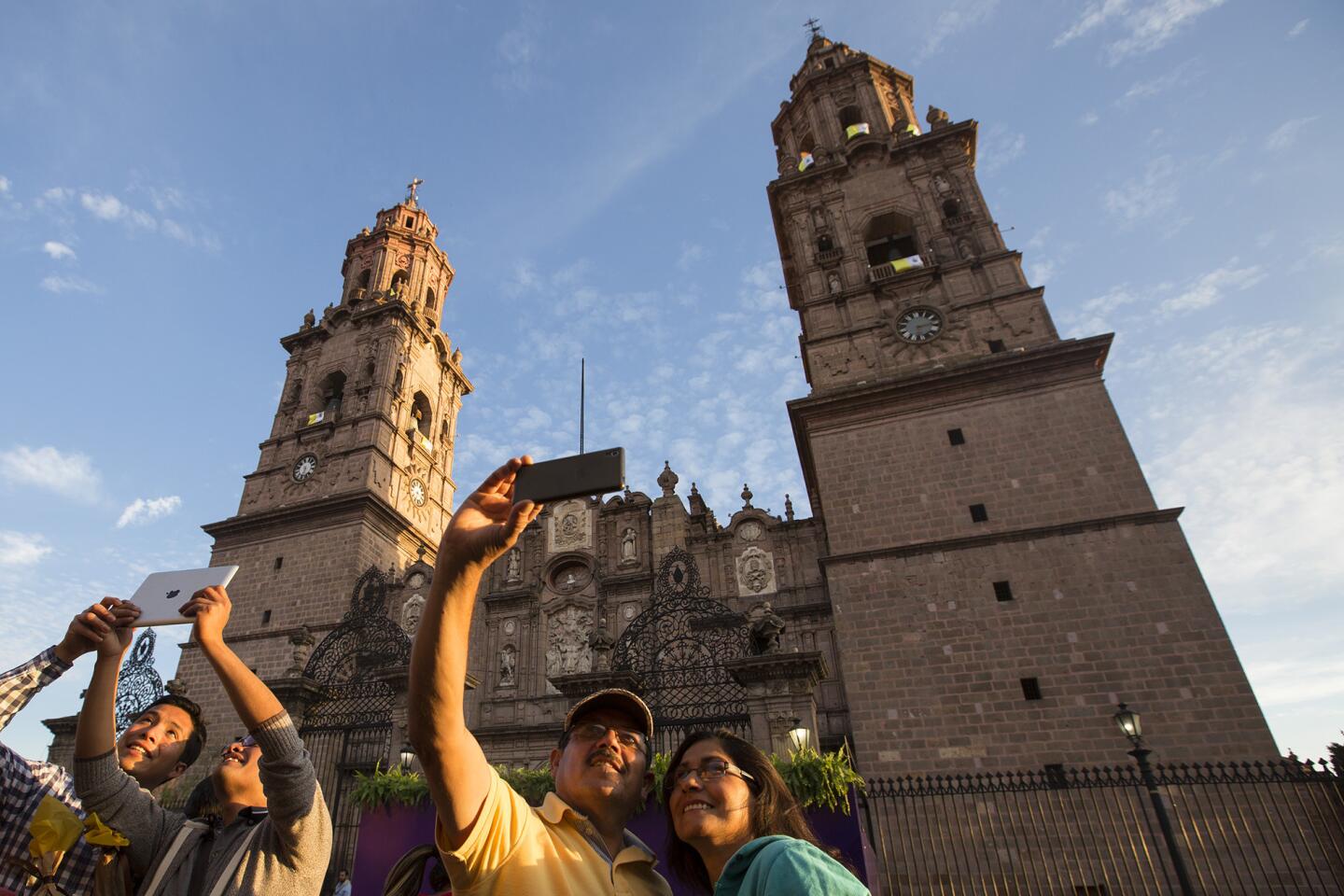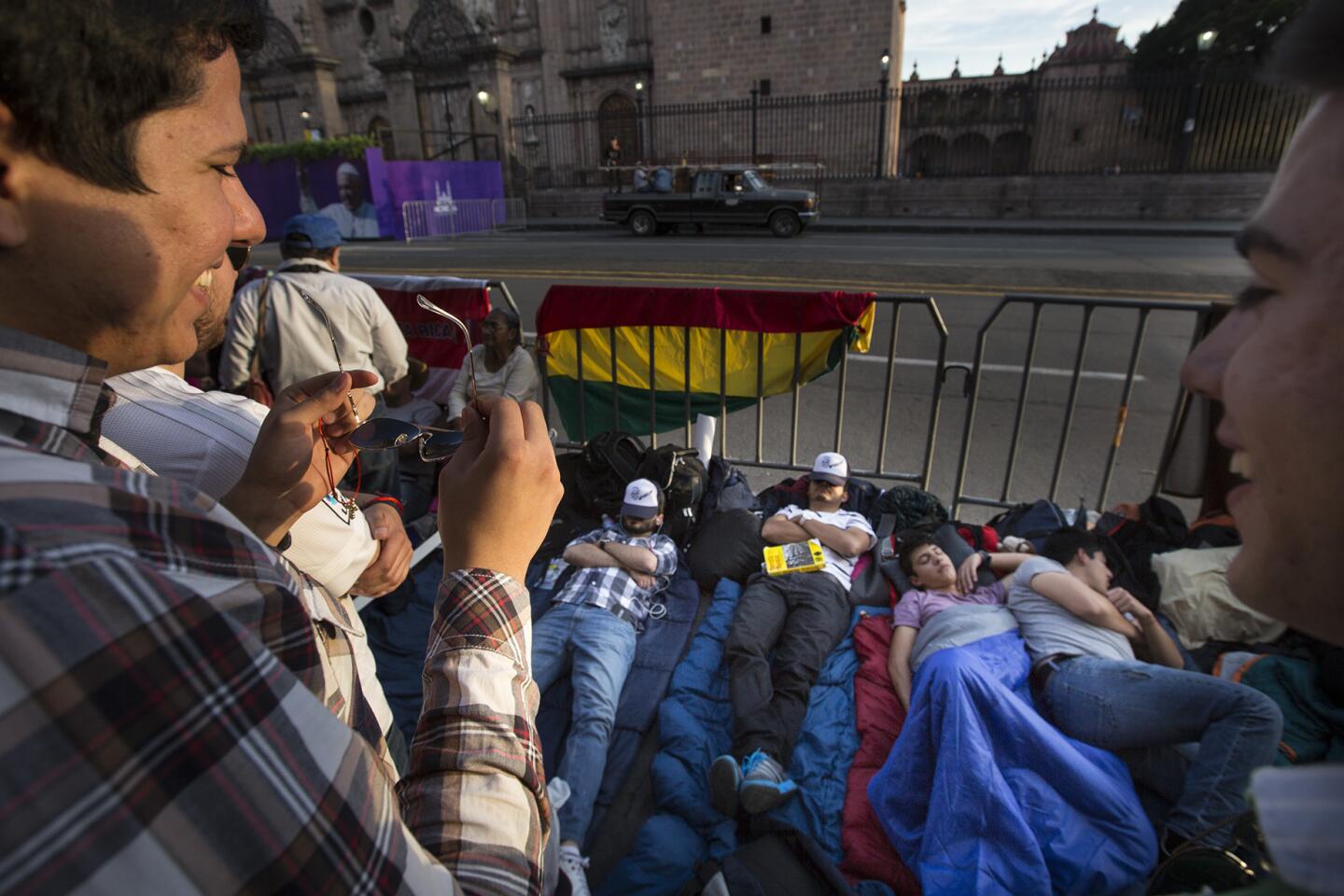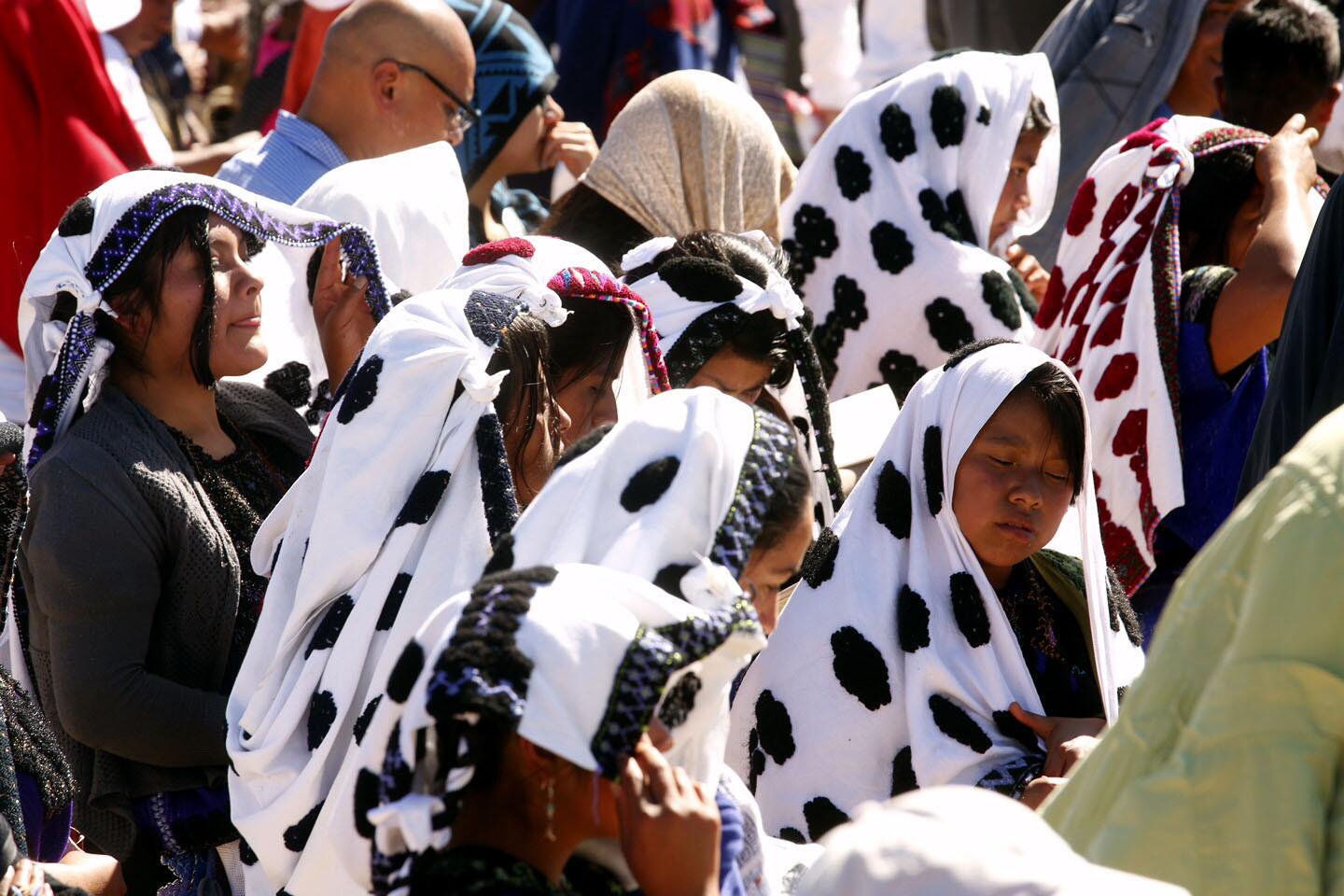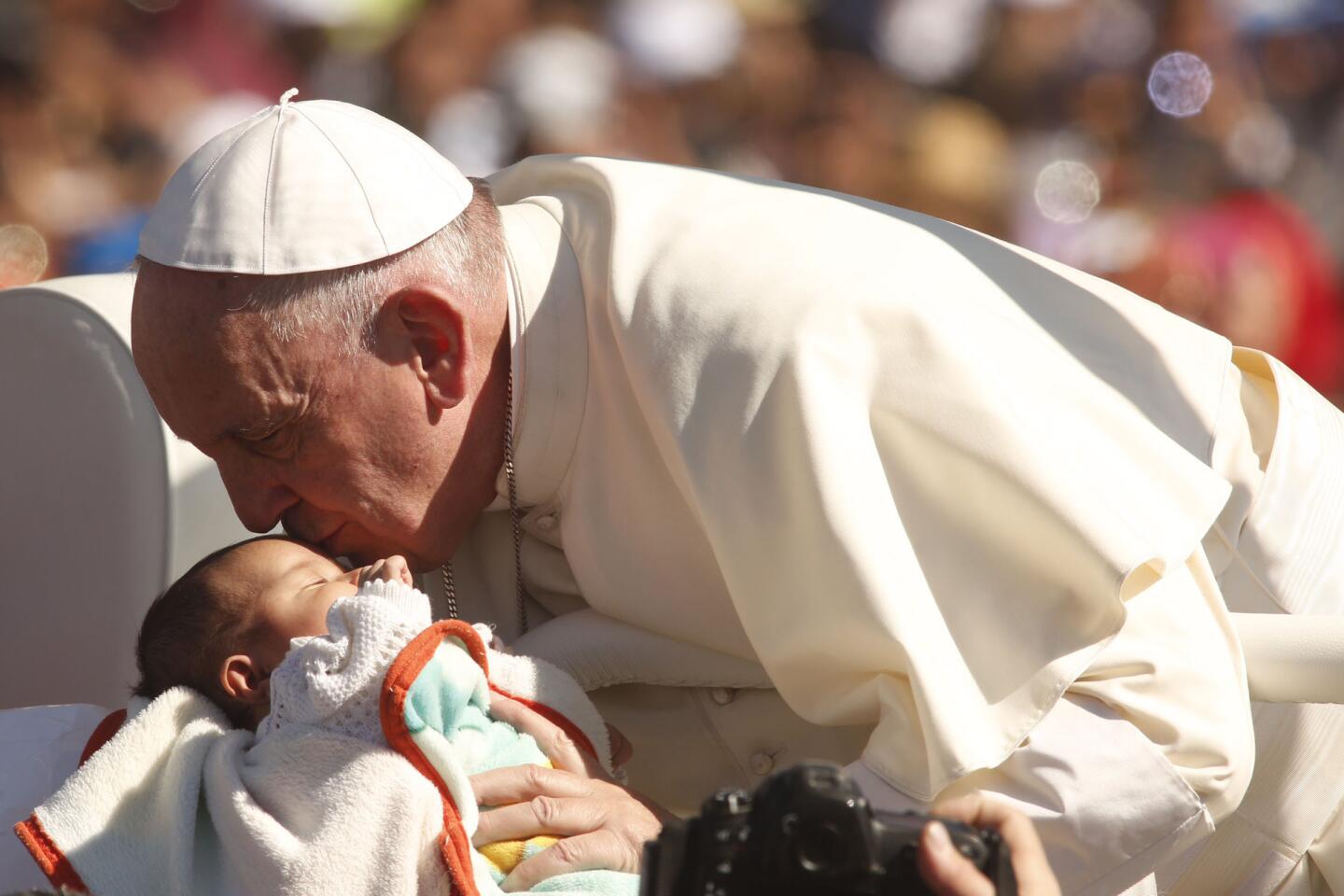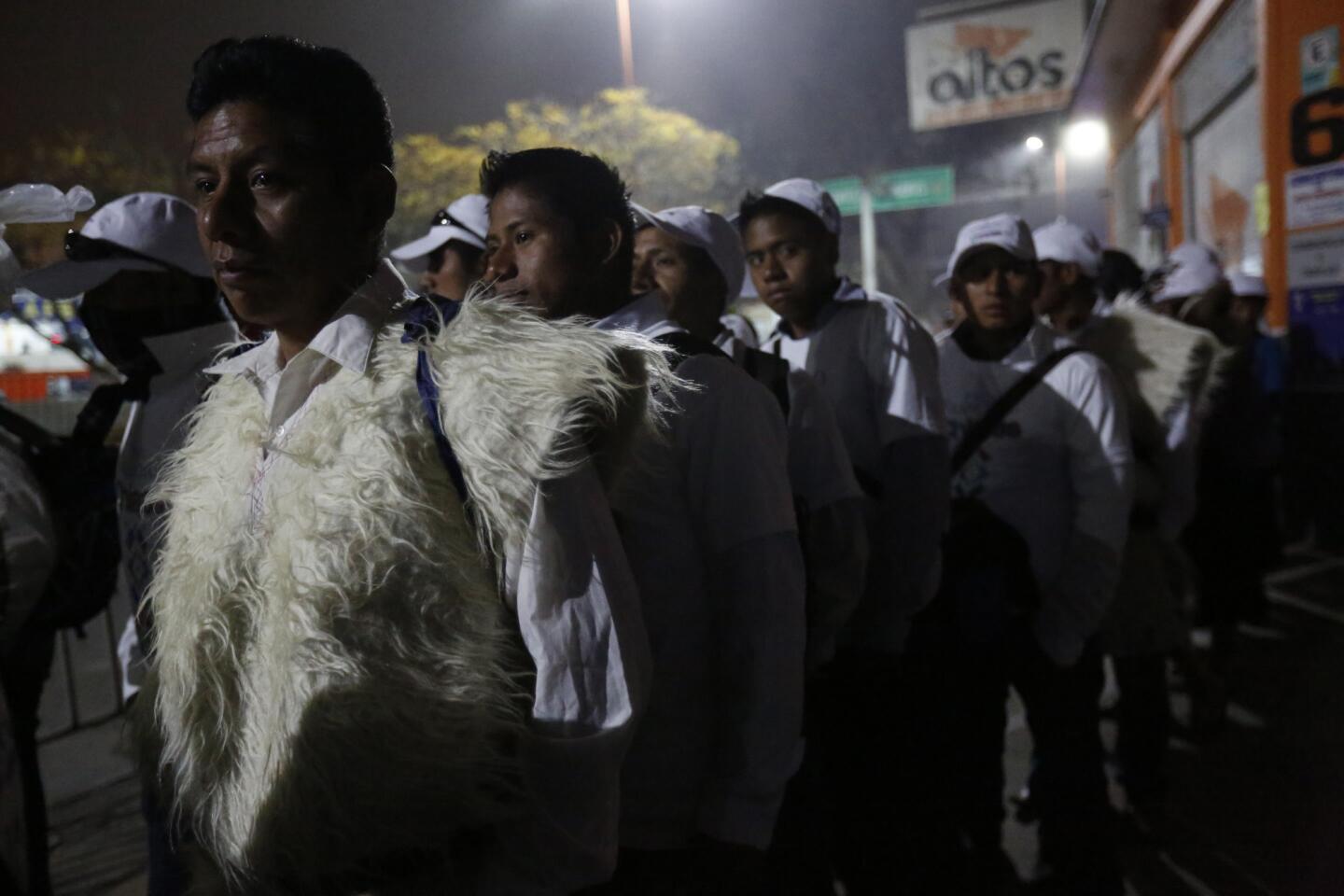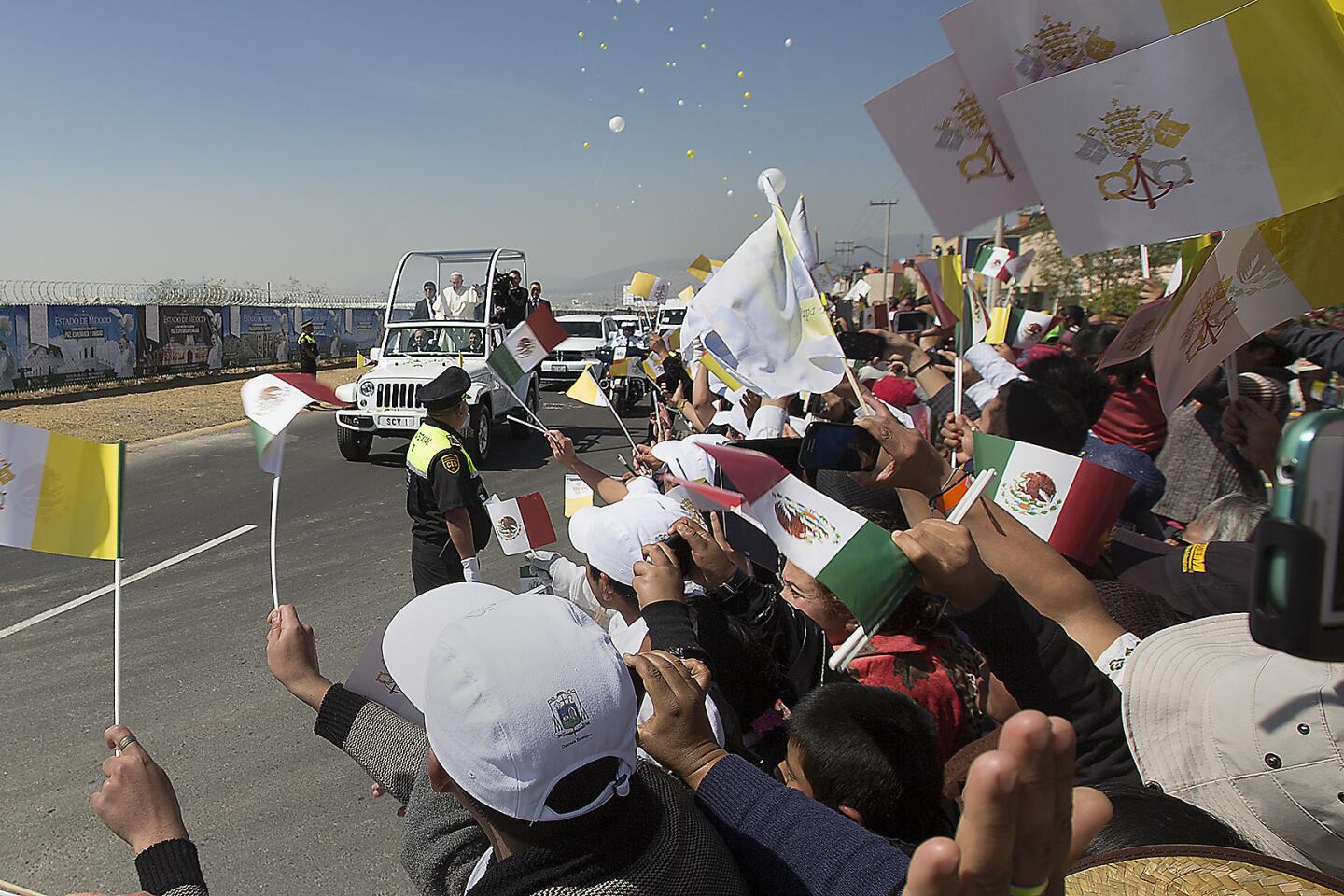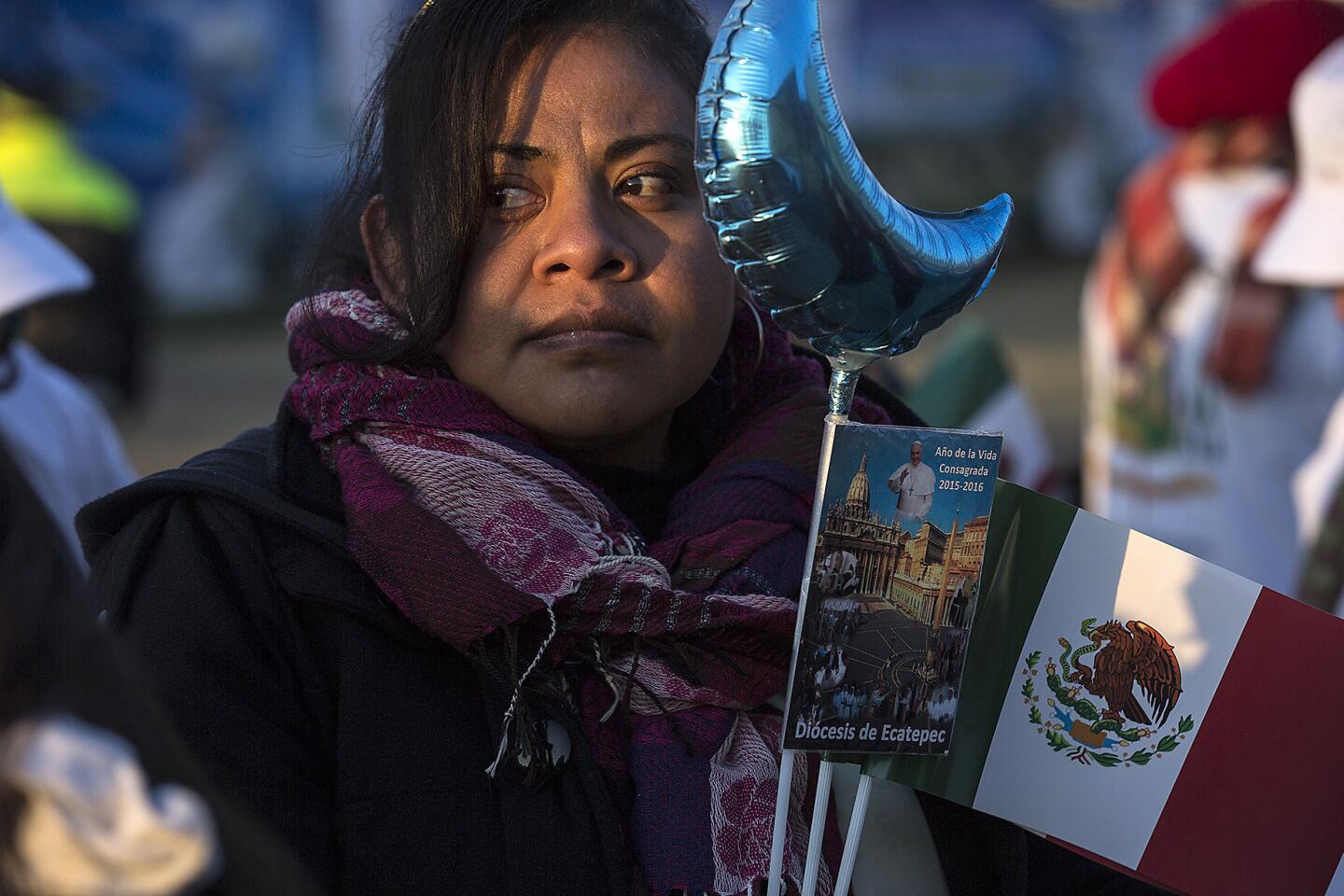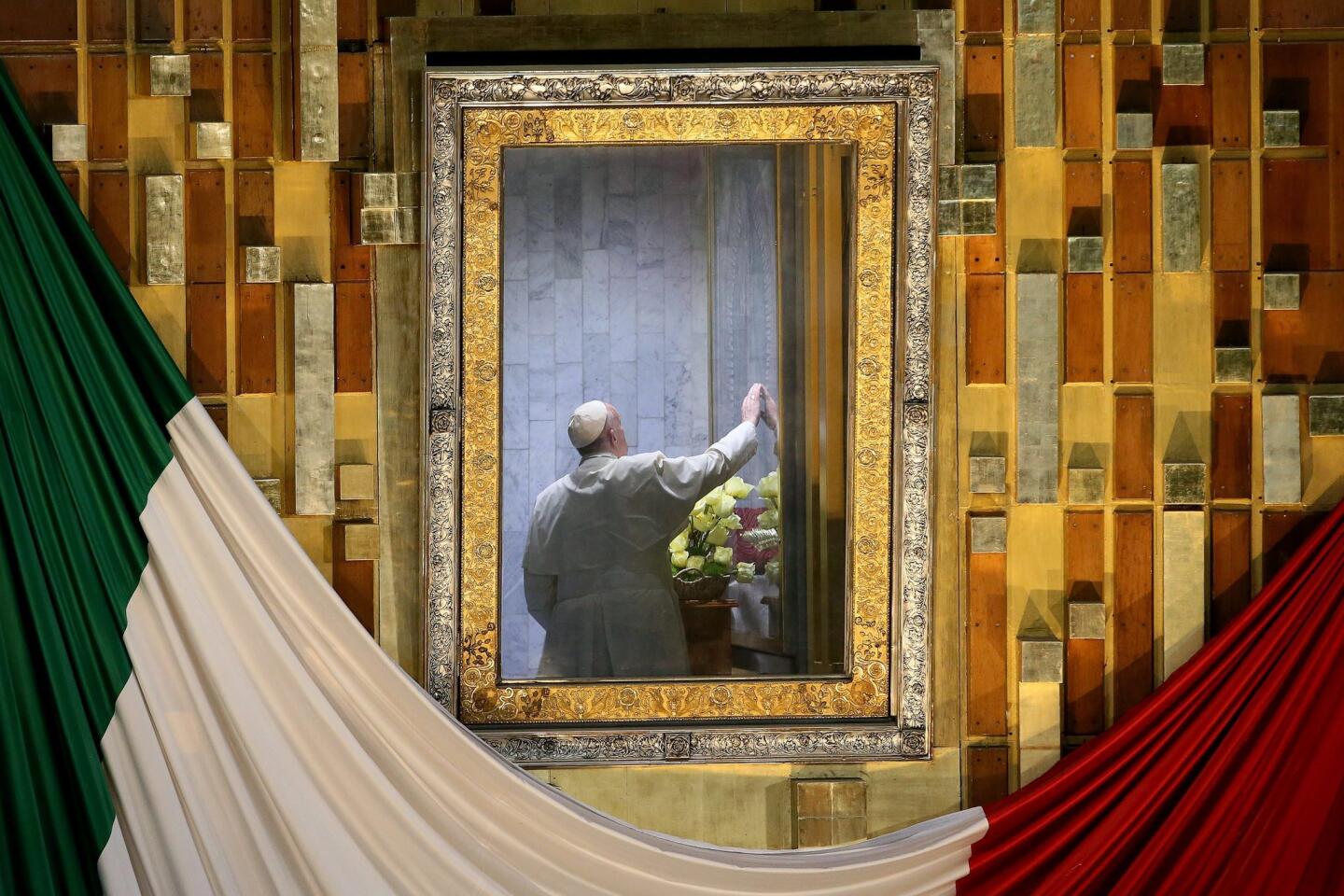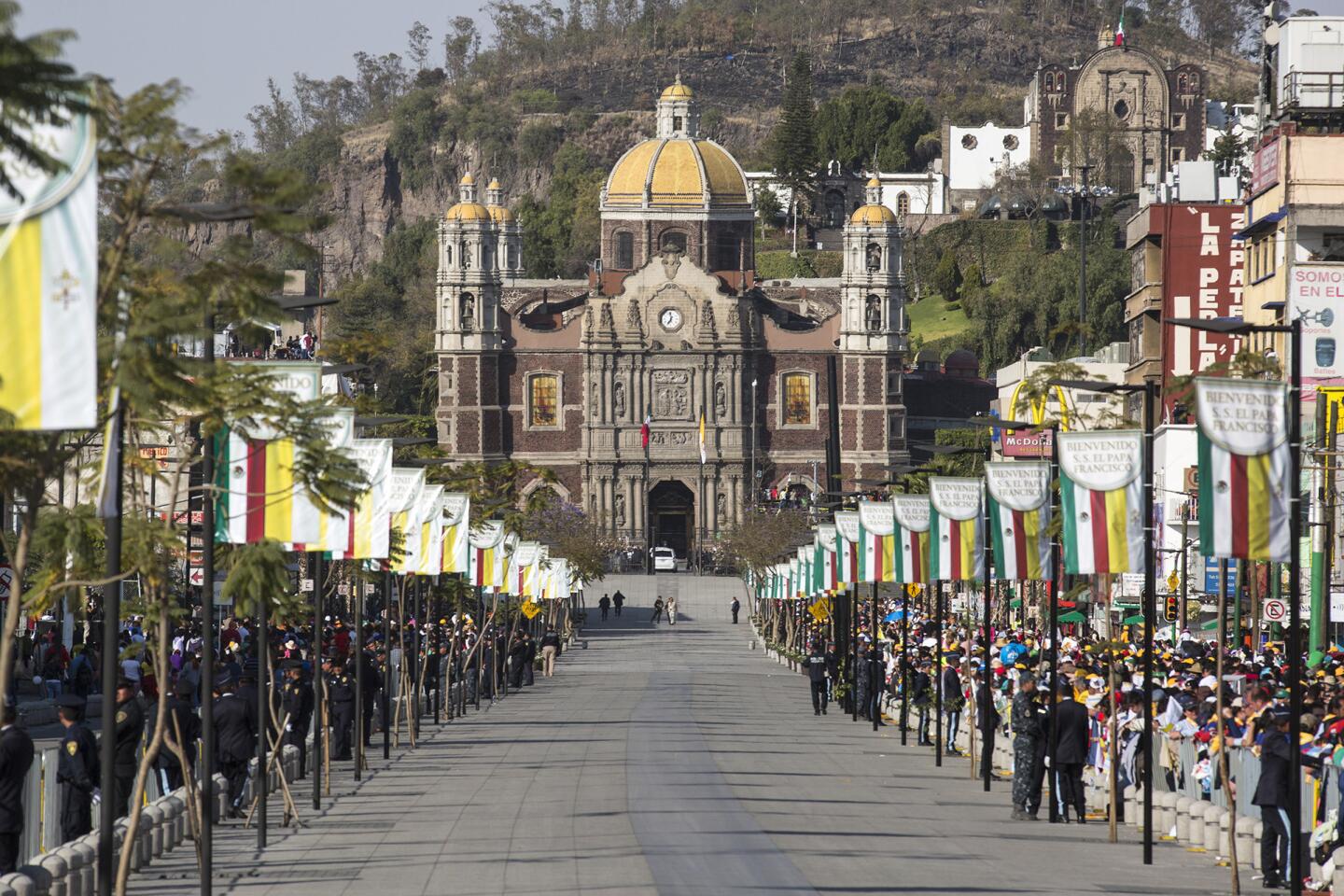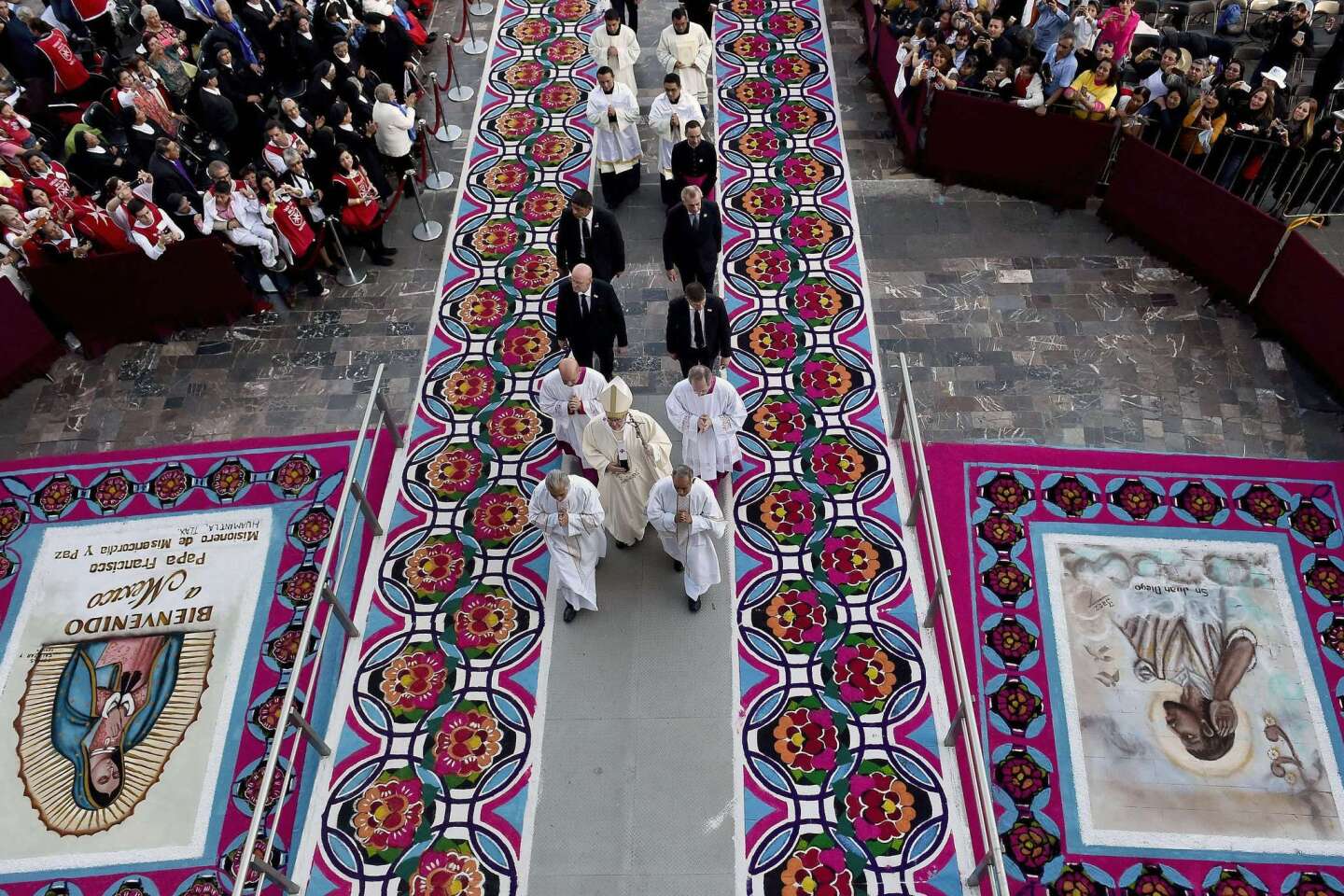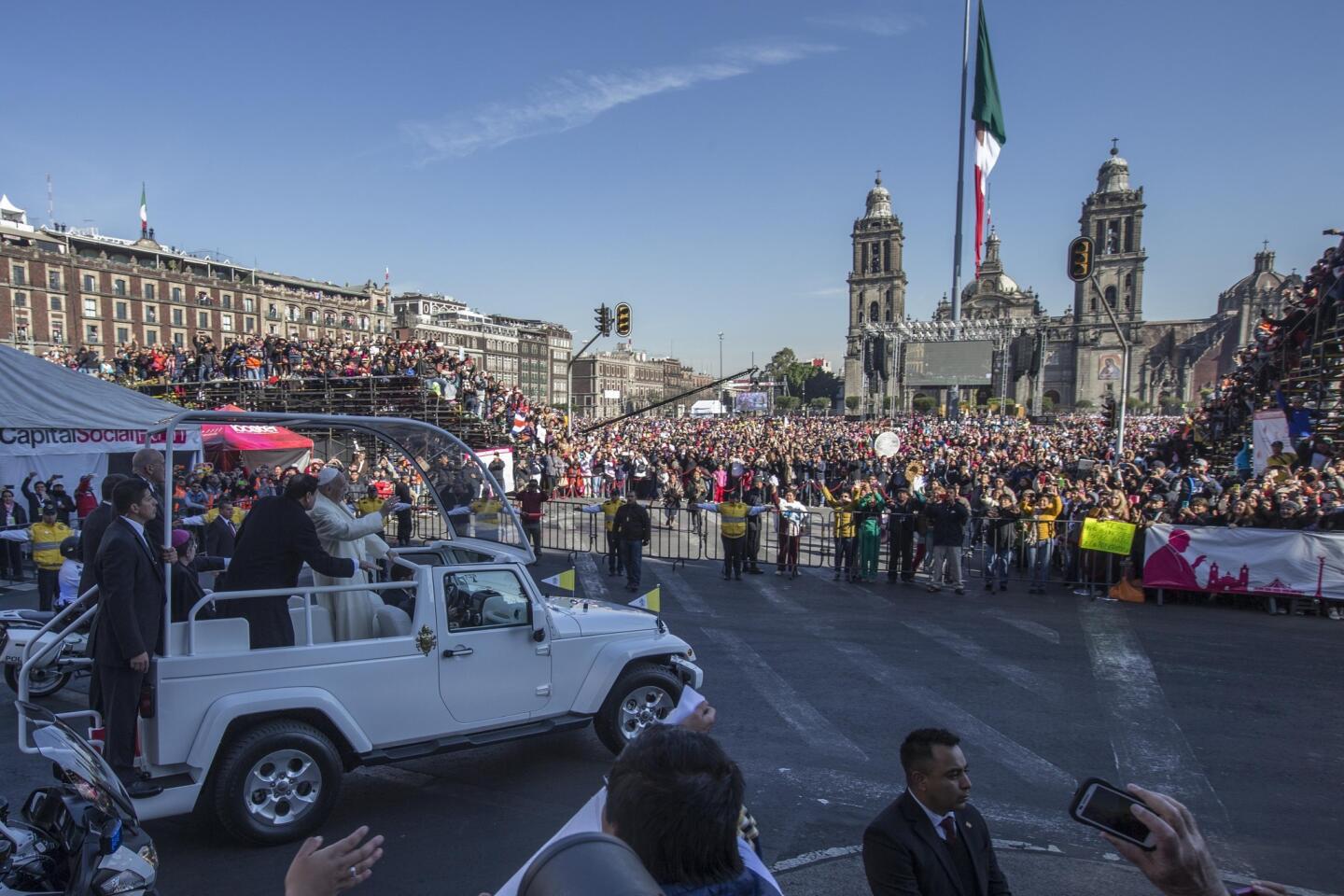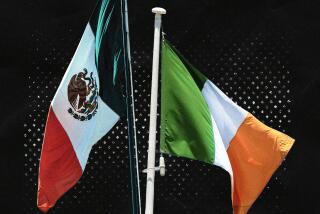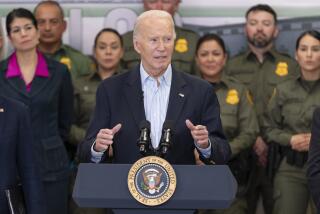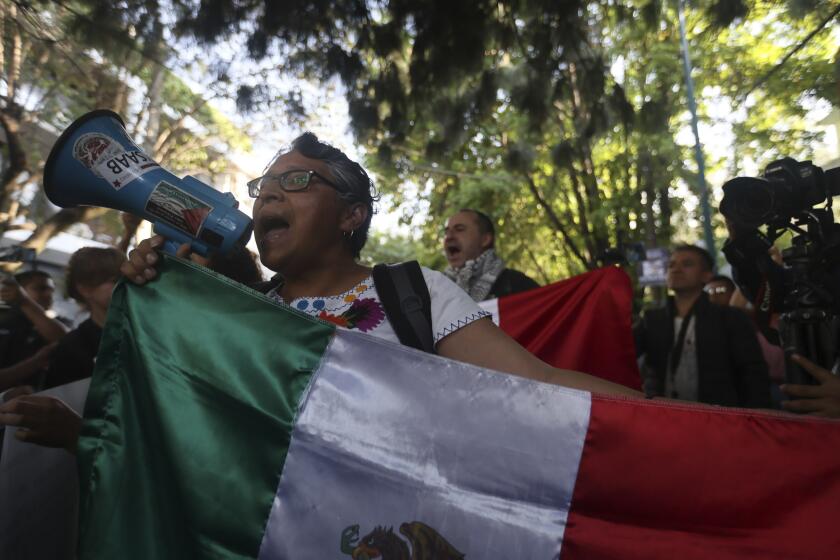Pope Francis decries ‘human tragedy’ that forces migration in landmark Mass at the U.S.-Mexico border
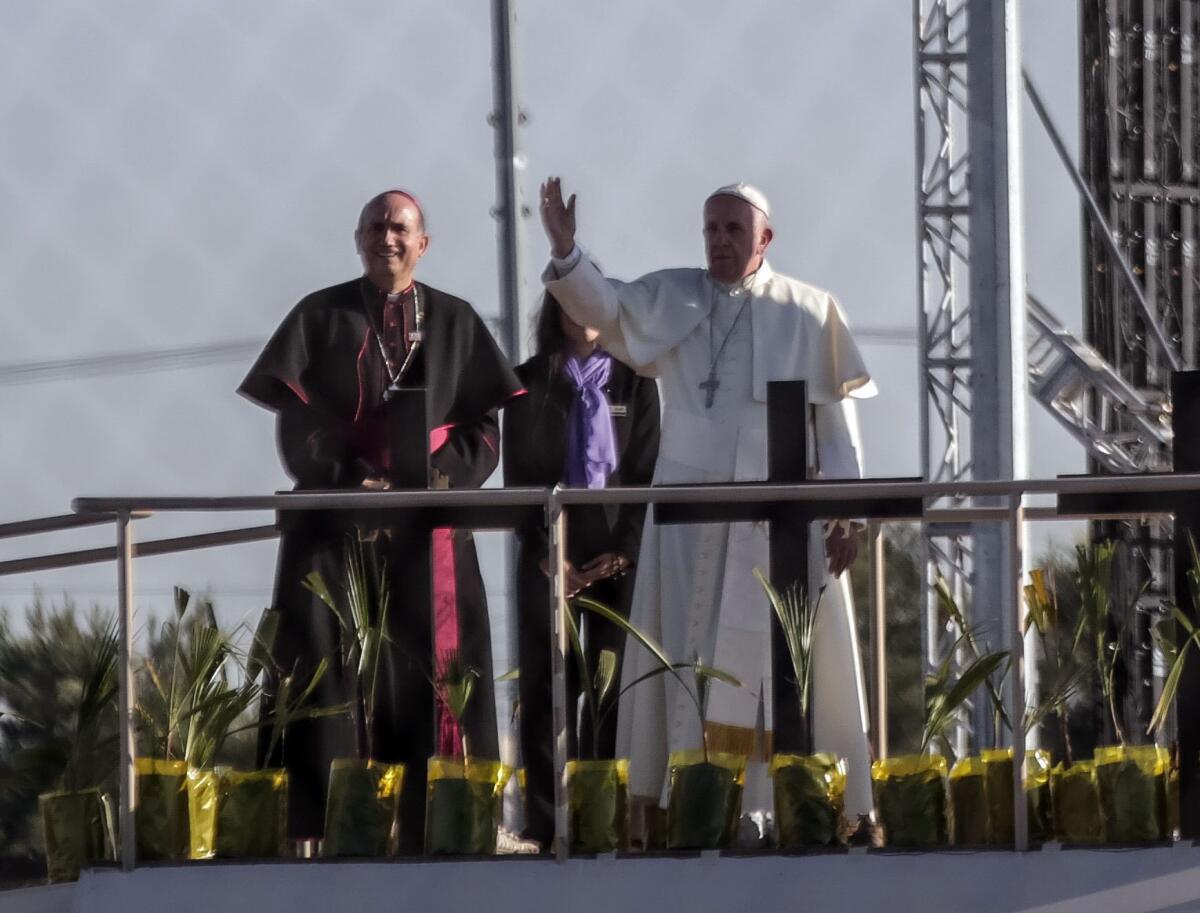
Pope Francis during a brief stop near the international border with the United States of America to greet the faithful from across the border, in Ciudad Juarez.
Pope Francis concluded an emotional, provocative journey through Mexico on Wednesday, symbolically tracing the path of migrants headed for the United States and ending up at the border that divides and unites two societies.
Tens of thousands of people gathered on both sides of the border — an election-year lightning rod that represents the tumultuous issue of immigration — to say Mass with the pope and hear his message of the need for fair wages, human dignity and an end to the violence convulsing Mexico. An estimated 70,000 people formed a human chain along the route of the papal motorcade in Juarez.
On the Texas side in El Paso, the faithful got as close as they could without leaving the U.S., gathering on a levee on the banks of the Rio Grande.
Before the Mass, the pope mounted a ramp overlooking the river, and the border, where one large cross and several smaller ones were posed to represent migrants killed in their attempts to reach the U.S. He said a blessing, with Texas on the nearby horizon. Those gathered on the levee waved and shouted, “Te queremos, papa!” — “We love you, pope.”
The pope did not cross into the U.S. but stayed here in the scruffy city of Juarez, once infamous for a sky-high homicide rate, especially among young women, many employed by foreign-owned factories along the border. But his message was clearly intended for both sides.
He decried the global “human tragedy” that forces people to migrate unwillingly, risking death — “each step, a journey laden with grave injustices: the enslaved, the imprisoned and extorted.”

Pope Francis celebrates Mass in Ciudad Juarez, Mexico.
Reserving special mention for women “unjustly robbed of their lives,” Francis said migrants “are the brothers and sisters of those expelled by poverty and violence, by drug trafficking and criminal organizations.”
“Injustice is radicalized in the young; they are ‘cannon fodder,’ persecuted and threatened when they try to flee the spiral of violence and the hell of drugs,” the first pontiff from the Americas said.
From his first public comments upon arriving in troubled Mexico five days ago, Pope Francis has spoken candidly and bluntly, telling those in power, including elected officials and even his own clergy, that they must not pursue wealth and material gains at the expense of the poor and needy. Mexico has one of the highest income gaps in the developed world.
Wednesday was more of the same. Speaking to an audience that included workers from the maquiladoras, or factories, as well as their owners and other members of the business elite, Francis advocated for fair pay and reasonable work burdens. The minimum wage in Juarez is less than $5 a day, and hours are long.
See the most-read stories this hour >>
He listened as one woman, Deysi Flores Gamez, complained that parents toil such long days and nights that they can’t care properly for their children, who often stray into a life of crime.
“God will hold accountable the enslavers of the day,” he said, speaking, as he has throughout, in his native Spanish.
And although the pope has denounced official corruption, drug trafficking and other Mexico ills, he did not, to the disappointment of many, mention specifically the town of Ayotzinapa, a code word now for the kidnapping and likely killing of 43 students by authorities in cahoots with a drug gang.
The Vatican had said families of the students were invited to Wednesday’s Mass, and almost to act as a reminder of their presence, a couple on the U.S. side of the border held up a yellow sign with the number “43” on it.
Juarez sits across the Rio Grande from El Paso, where people were watching the pope via large television screens. Some approached the levee that marks the U.S. spot closest to Mexico on the river’s banks.
Claudia Diaz, a 44-year-old woman without legal status who lives in New Mexico, walked onto the levee past Border Patrol agents and a highly fortified U.S.-Mexico border fence.
She said she wasn’t scared and instead focused on finding her seat in a VIP section — the closest spot to the pope on the U.S. side.
“This right here, what the pope is doing, is a miracle because he has permitted for people like us to be at this place — in these lands that are so guarded, so militarized, where so many have died trying to cross this river,” she said, pointing to the Rio Grande, which was mostly parched.
“For us to be here at this moment is very big.”
After the pope’s blessing at the border, after Francis had headed back toward the Juarez fairgrounds for the Mass, Diaz and most of the people on the levee sat quietly but couldn’t hear much.
Diaz was weeping.
“It really was beautiful,” she said.
“This is so unjust — being here on this side and not to be able to cross and be over there with him,” she said, gesturing toward Mexico. “We just have to be content with being on this side.”
Diaz, originally from Juarez, said many of her cousins and friends and her mother-in-law were attending the Mass on the other side.
A big banner with the message “immigrantlivesmatter” on the El Paso side of the border was visible from the levee.
“That’s our message to the pope,” Diaz said.
Retired Archbishop Roger Mahony of Los Angeles joined the crowd of about 500 people on the levee. Many were immigrant rights activists, and some were unaccompanied children from Central America who are in the country without legal status.
“I wanted to be on this side, especially with the young people who cannot be on the other side of the border because they are immigrants without papers,” Mahony said.
At one point he asked three young Guatemalan boys to pose along the border fence and reach out with their hands before he snapped a picture of them with a small camera. He said he wanted them to know, “This is about you.”
Alex Diaz, 35, was born in Juarez and lives in El Paso, but returned for the Mass with her husband and three daughters, ages 16, 13 and 9. Their school didn’t close, and she had to miss work, but she said it was worth it.
“This is history for them,” she said.
Her mother won’t come to Juarez except briefly since her son’s killing there in 2004, she said. He had become involved with narcos, and when his body was found, bearing signs of torture, Diaz had to accompany her parents to the morgue to claim it. She still remembers how the women working there made her family wait while they perused a shoe catalog. Diaz doesn’t see that culture accustomed to brutal violence changing any time soon. But in the presence of so many joyous people at the Mass, she had hope.
“I’m not going to say we’re going to get a miracle, it’s more changing the mentality,” she said, and talked about her family watching at home in El Paso.
“Hopefully this helps my mom have more hope in her heart,” she said, as she stood to catch a glimpse of the pope.
See more of our top stories on Facebook >>
Earlier Wednesday, at his first stop in Ciudad Juarez, Francis visited a notorious prison, saying he could not ignore the most marginalized of Mexican society. He denounced a culture that incarcerates those trapped “in a cycle of violence and crime.”
“We have already lost many decades thinking and believing that everything will be resolved by isolating, separating, incarcerating, and ridding ourselves of problems, believing that these policies really solve problems,” the pope said, after hearing a female inmate speak on behalf of the prison’s population and embracing her.
“We have forgotten to focus on what must truly be our concern: people’s lives; their lives, those of their families, and those who have suffered because of this cycle of violence,” he said.
Inmates filed in a line to greet the pope individually, as a band played “Besame Mucho” — “Kiss Me a Lot.”
Inmates had spiffed up the facility before the pope’s arrival, painting and removing trash. They — men and women — wore identical uniforms emblazoned with the name of the prison.
“From inside this prison,” the pope continued, “you must work hard to change the situations which create the most exclusion. Speak with your loved ones, tell them of your experiences, help them to put an end to this cycle of violence and exclusion.
“The one who has suffered the greatest pain, and we could say ‘has experienced hell,’ can become a prophet in society. Work so that this society which uses people and discards them will not go on claiming victims.”
In a moment of silent prayer at the end of his message, some inmates could be seen weeping.
At the border Mass, the pope’s focus was on victims.
“Let us together ask our God for the gift of conversion, the gift of tears, let us ask him to give us open hearts,” the pontiff preached, urging followers to be “open to his call heard in the suffering faces of countless men and women.”
“No more death! No more exploitation!” he said. “There is still time to change, there is still a way out and a chance, time to implore the mercy of God.”
Times staff writers Hennessy-Fiske reported from Ciudad Juarez, Carcamo from El Paso and Wilkinson from Washington.
MORE ON POPE FRANCIS IN MEXICO
An unusual offering for a pope: the worn, dirty shoes of migrants
For migrants traveling to see Pope Francis, an unexpected reunion
Families of missing Mexican students ask: Will Pope Francis speak of ‘los 43’
More to Read
Start your day right
Sign up for Essential California for news, features and recommendations from the L.A. Times and beyond in your inbox six days a week.
You may occasionally receive promotional content from the Los Angeles Times.
